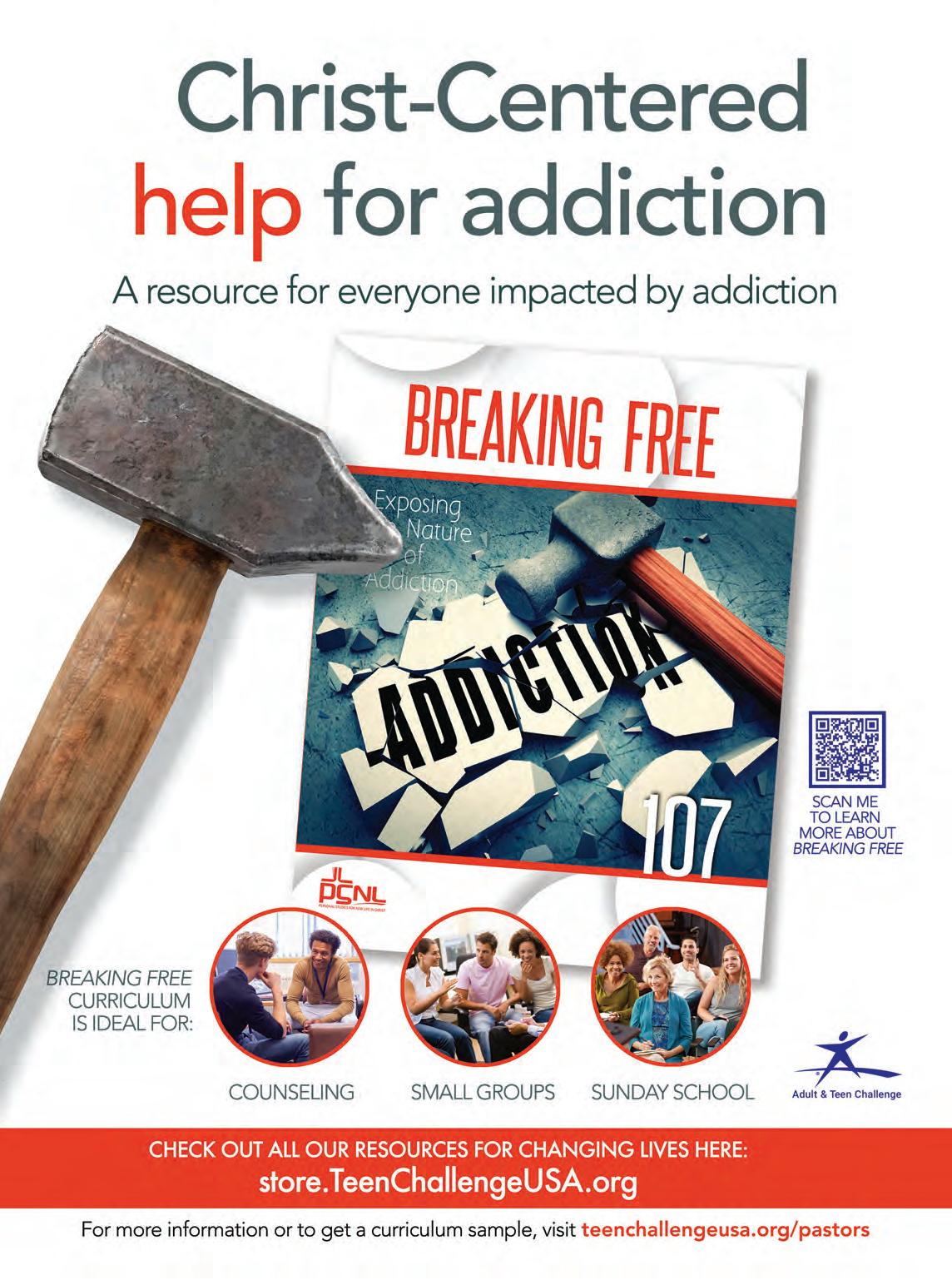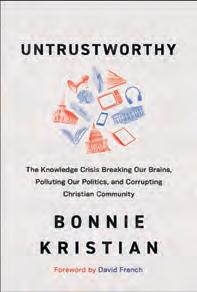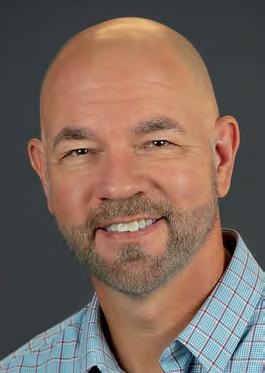

LEADERDRIFT 58 / REACHING INTO THE FUTURE 66 The shape of leadership Fall 2 0 22 Discouragement in ministry is inevitable. Working through it is vital. OUTbut n ot






Acct. No. 390907 P.O Box 1046 Springfield, MO 65801 www.jacobshope.com (417) 865-3295 jacobshope@jacobshope.com CelebratingThirteen Years of BringingHopetoJewishPeople! Now Is The Time Now Is The Day Of Salvation Your generous support helps Jacob's Hope bring Messianic Hope to Jewish People around the World Please stand with Jacob's Hope in these challenging and prophetic times to serve and bless Jewish people in Israel and the nations LOVE H OPE M ESSIAH An A ss e mblies o f God W orld Mission - International Ministries Your prayers and partnership help provide compassionate ministry, teaching, discipleship, and evangelistic outreach opportunities among the Jewish people. I Will Bless Those Who Bless You Gen. 12:3

The shape of leadership influencemagazine.com
INFLUENCE MAGAZINE
1445 N. Boonville Avenue Springfield, MO 65802-1894
Influence magazine is published by The General Council of the Assemblies of God.
Publisher: Douglas E. Clay
Executive Editor: George P. Wood
Lead Editor: Christina Quick
Designers: Steve Lopez, Marc McBride, Josh Thomassen Advertising Coordinator: Ron Kopczick
CONTRIBUTORS
Stephen Blandino, Doug Clay, John Davidson, Greg Davis, Holly Davis, Casey Gibbons, Scotty Gibbons, Dick Gruber, Kristen Kansiewicz, Joseph M. Lear, Kristi Northup, Ruthie Oberg, Jared Pingleton, Jeffery Portmann, Christina Quick, Nate Ruch, Chris Sonksen, Allen Tennison, Marshall M. Windsor, George P. Wood
SPECIAL THANKS
Donna L. Barrett, Malcolm Burleigh, Douglas E. Clay, Wilfredo De Jesús, Rick DuBose, Greg Mundis
EDITORIAL
For info or queries, contact editor@influencemagazine.com.
ADVERTISING
Display rates available upon request. Contact advertising@influencemagazine.com. By accepting an advertisement, Influence does not endorse any advertiser or product. We reserve the right to reject advertisements not consistent with the magazine’s objectives.
Website: influencemagazine.com
Twitter: @theinfluencemag
Facebook: facebook.com/theinfluencemag
SUBSCRIPTIONS
To subscribe, go to influencemagazine.com or call 1.855.642.2011. Individual one-year subscriptions are $17. Bundle one-year subscriptions are $12 per subscription, for a minimum of six or more. International one-year subscriptions are $51, postage included. For additional subscription rates, contact subscribe@influencemagazine.com. Please send all other feedback, requests and questions to feedback@influencemagazine.com.
Copyright © 2022 by The General Council of the Assemblies of God, 1445 N. Boonville Ave., Springfield, MO 65802-1894. Permission required for reprints. All rights reserved.
All materials published herein including, but not limited to articles, photographs, images, and illustrations are pro tected by copyright and owned or controlled by Influence magazine of The General Council of the Assemblies of God.
All Scripture quotations, unless otherwise indicated, are taken from the Holy Bible, New International Version®, NIV®. Copyright ©1973, 1978, 1984, 2011 by Biblica, Inc.™ Used by permission of Zondervan (www.zondervan.com).
All rights reserved worldwide. The “NIV” and “New Inter national Version” are trademarks registered in the United States Patent and Trademark Office by Biblica, Inc.™
Influence magazine (USPS Publication: 0000-7180; ISSN: 2470-6795) is published quarterly by The General Council of the Assemblies of God (1445 N. Boonville Avenue, Springfield, MO 65802-1894). Periodicals postage paid at Springfield, Missouri, and at other mailing offices. Printed in the U.S.A.
Member of Evangelical Press Association

POSTMASTER
Send address changes to Influence magazine: 1445 N. Boonville Avenue Springfield, MO 65802-1894
2 Fall 2022





COVER STORY 46 CONTENTS Issue 40 | Fall 2022 58 Leaderdrift Toxic behaviors that can wreck your ministry CHRIS SONKSEN 66 Reaching Into the Future Leadership that blesses the next generation NATE RUCH 74 What We Believe About Scripture A series on the AG Statement of Fundamental Truths ALLEN TENNISON 4 Fall 2022 Discouragement in ministry is inevitable. Working through it is vital. JEFFERY PORTMANN but not
THE
THE HEART
THE
IT COUNT
IS
STORY
SELF 18
Goodness and Gratitude
Thanksgiving comes from knowing God | GEORGE P. WOOD

Marriage, Praying for America

Four ways to influence the nation | DOUG CLAY
What Growth Is and How It Happens

10-week study for leadership teams | STEPHEN BLANDINO

Persevering Through Pain
When suffering hits home | GREG DAVIS

LEADERSHIP
Stepping Up
Michele Thompson empowers women to lead at higher levels | CHRISTINA QUICK

Your First 90 Days
How to hit the ground running as a new lead pastor | JOHN DAVIDSON


HOME 22
Thriving at Home and in Ministry Leaders don’t have to choose between the two | SCOTTY and CASEY GIBBONS
PRACTICE
E THICS
HIS TORY
Developing a Culture of Evangelism Five ways to inspire your congregation to reach its c ommunity | MARSHALL M. WINDSOR


When Preaching Goes Bad
Wha t Matthew 23 teaches about content and character | GEORGE P. WOOD
Ministers and Mental Health
The state of AG pastors today | KRISTEN KANSIEWICZ
A Harvest of Souls
Lessons from the life and legacy of Juan Lugo | RUTHIE OBERG

• Christus Victor for Pentecostals
• Fixing America’s
Crisis | GEORGE P. WOOD
Fall 2022 5
14PROFILE
26
30
INSIGHTS 34
38
REVIEW S 42
Knowledge
DEPARTMENTS 8
10 Respecting
112
A
128
FROM
EDITOR FROM
OF
GS MAKE
THIS
MY
Kid-Friendly Altar







6 Fall 2022 MINISTRY Q& A 86 Exploring the Lands of the Bible A conversation with Center for Holy Lands Studies Director Amy Flattery PREA CHING 90 A Bible-Reading Culture Do your sermons promote daily interaction with God’s Word? | JOSEPH M. LEAR W ORSHIP 94 Show and Tell Helping churchgoers learn to worship | KRISTI NORTHUP KIDS 98
Calls The do’s and don’ts of leading response times for children | DICK GRUBER Y OUTH 102 Holding on to Gen Z Three ways to keep young people in church | HOLLY DAVIS ADULTS 106 Ministry to Depressed People Responding redemptively to those who are hurting | JARED PINGLETON More than a magazine podcastsCheck out our influencemagazine.com/podcast


Send Good News and Great Joy in Jesus’ Name Thanks to the generosity of churches and individuals, Samaritan’s Purse has collected and delivered gift-filled shoeboxes to more than 198 million children in need around the world since 1993. After hearing the Gospel clearly presented at outreach events, millions of shoebox recipients also participate in our 12-lesson discipleship course, The Greatest Journey, where they learn to follow Christ and share Him with others. Declare His glory among the nations! Psalm 96:3 VIEW SOLICITATION DISCLOSURE INFORMATION FOR SAMARITAN’S PURSE ONLINE AT SAMARITANSPURSE.ORG/DISCLOSURE. NATIONAL COLLECTION WEEK NOV. 14-21 Operation Christmas Child® is a project of Samaritan’s Purse® Franklin Graham, President | 1-800-353-5949 | samaritanspurse.org © 2022 Samaritan’s Purse. All rights reserved. To learn more, scan the QR code or visit samaritanspurse.org/occ GOOD NEWS. GREAT JOY.
Goodness and Gratitude
By GEORGE P. WOOD
My favorite national holiday is Thanksgiving.
It brings family and friends together around a table laden with food. The fact that my wife is an excellent cook makes it all the more enjoyable.
Thanksgiving has a fourth F, though — faith. It is an inherently theological holiday. Thanks is always given to someone, after all.
While we are grateful for the farmers who raised the turkeys we are eating, the grocers who sold them, and the cooks who prepared them, Thanksgiving is not about the supply chain that put food on our tables.

Nor is it about the people around those tables. My father died earlier this year. His loss makes me espe cially grateful for family still here. Even so, gratitude moves past the human to the divine.
Which brings us to Scripture: “Give thanks to the Lord, for he is good; his love endures for ever.” That imperative is found seven times in Israel’s hymnody (1 Chronicles 16:34; 2 Chronicles 5:13; Psalms 106:1; 107:1; 118: 1,29; and 136:1). It expresses the fundamental connection between theology (who God is) and spiritu ality (how we respond to Him).
Proclaiming the goodness and love of God is easy when the table is piled high and the chairs around it are filled. It’s harder when the cupboard is bare and loved ones are absent. That’s why Scripture doesn’t root gratitude in our circumstances, which change, but in God’s character, which doesn’t.
We see this clearly in Psalm 107, which describes people in a variety of parlous circumstances: hun ger and thirst in the desert (verses 4–9), darkness in prison (verses 10–16), nearness to death (verses 17–22), and terror on the high seas (verses 23–32). Some times, sin is the cause of their peril (verses 10–12,17), but not always. Sometimes, life is just hard.
Whatever the circumstance, God is good and loving. Psalm 107 portrays this truth in terms of a reversal of fortune. The hungry are fed, the prison ers freed, the sin-sick healed, and the storm-tossed brought safely to harbor. The Psalmist exhorts all with these words,
“Let them give thanks to the Lord for his unfailing love and his wonderful deeds for man kind (verses 8,15,21,31).
I don’t know what your cir cumstances are this year — good, bad, or something in between. I can’t say when God will come to your aid. I know
He will, however. It is against His good and loving nature to ignore those who cry for His help.
God’s goodness is the reason for our gratitude.
GEORGE P. WOOD is executive editor of Influence magazine.

FROM THE EDITOR 8 Fall 2022
Proclaiming the goodness and love of God is easy when the table is piled high and the chairs around it are filled. It’s harder when the cupboard is bare and loved ones are absent.
Striking. Trim. Versatile
NLT Filament
Journaling Collection
Enjoy the stylish covers, understand God’s word in the New Living Translation, go further with the Filament Bible app, and add your thoughts or draw on journal pages. These exquisitely designed, lightweight editions
Designed for personal and small group use, or to follow a sermon series.

NEW
SEE MORE AT FILAMENTBIBLES.COM
Tyndale
, Tyndale’s quill logo, New Living Translation NLT, the New Living Translation logo, Filament, and the Filament logo are registered trademarks of Tyndale House Ministries.
Respecting Marriage, Praying for America
Four ways to influence the nation
By DOUG CLAY
When God created Adam and Eve and brought them together, He created the institution of marriage.
God made the first man and the first woman in His own image (Genesis 1:27). He saw that every aspect of His creation was “good” or “very good” (1:4,10,12,18,21,25,31). And yet, when God contemplated man without woman, He said, “It is not good for the man to be alone. I will make a helper suitable for him” (2:18). The Creator did this by making “a woman from the rib he had taken out of the man” (2:22). Matthew Henry comments on the importance of this verse for the relationship of husband and wife: The woman was made of a rib out of the side of Adam; not made out of his head to rule over him, nor out of his feet to be trampled upon by him, but out of his side to be equal with him, under his arm to be protected, and near his heart to be beloved.

10 Fall 2022
FROM THE HEART OF THE GS
Adam himself exulted in the intimate equality he had with Eve when he said, “This is now bone of my bones and flesh of my flesh” (2:23).
These verses lay the foundation of a Christian view of marriage.
As Christians, we believe marriage is the volun tary, lifelong union of a man and woman. In other words, it is a heterosexual institution. It contributes to human flourishing, not only by uniting a husband and wife with each other, but also by producing offspring and extending God’s loving stewardship throughout the earth (Genesis 1:28–30).
Marriage is a type of Christ’s relationship with His Church (Ephesians 5:31–32), in which we are Christ’s bride (Revelation 21:2,9).
Moreover, marriage is a monogamous institu tion. It is a sacred covenant between “man” and “wife,” both terms being singular (Genesis 2:24).
The prophet Malachi, speaking for God, exco riated the men of Israel because they had been fooling around: “The Lord is the witness between you and the wife of your youth. You have been unfaithful to her, though she is your partner, the wife of your marriage covenant” (Malachi 2:14).
All this information is basic to our understanding of marriage. It’s something you already know and already teach. So you may be wondering why I’m mentioning it now.
For the past few months, I have felt an increas ing urgency to pray for Assemblies of God churches and ministers to teach and model a biblical view of marriage. Also, I have felt led to pray more intensely for the protection of our religious freedom to do so.
The proximate cause of that urgency was the passage of the so-called Respect for Marriage Act (RFMA) by the U.S. House of Representatives on July 19. The bill repeals the Defense of Marriage Act (1996), which defined marriage in federal law as “a legal union between one man and one woman as husband and wife.”
I recognize that in some ways, RFMA is simply catching up with the Supreme Court’s Obergefell decision (2015), which requires states to recognize same-sex marriage. And yet, in other ways, it’s evi dence of our nation’s continued moral drift.
In my opinion, RFMA is anything but respectful to marriage.
It seeks to redefine marriage — our most basic human institution.

If marriage need no longer be understood as a heterosexual institution, how long will it be before legislation decides marriage doesn’t have to be monogamous either?
And as is often the case with pro-LGBT laws, there may be negative consequences for the religious freedom of people and organizations who teach and practice a biblical and traditional view of marriage.
According to Michael P. Farris, former president and CEO of Alliance Defending Freedom, RFMA
As Christians, we believe marriage is the voluntary, lifelong union of a man and woman.
Fall 2022 11
-
“empowers the government to punish millions of Americans who hold decent and honorable beliefs about marriage — beliefs that have existed since time immemorial — exposing citizens to predatory lawsuits and even endangering the nonprofit status of faith-based organizations.”
Religious freedom is a big deal. It’s not just about the freedom to believe what you choose to believe; it’s the free dom to live, speak and act according to those beliefs.
The Assemblies of God has a long tradition of being apolitical. We do not endorse politicians or electioneer on their behalf. Being apolitical does not mean being ignorant of the times in which we live, however.
Unfortunately, we live in a time of a moral revolution. The biblical foundations are being dug up and pulverized, while activists and pol iticians lay new ones in their place. Marriage should be a cultural foundation rather than a political football, but for many years now, the very definition of mar riage has been a matter of debate.
So, what should we do? Let me close by suggest ing four concrete actions we all need to take:

First, pray for the nation. Second Chronicles 7:14 was written to Israel, but it also serves as a model of prayer for the Church. “If my people, who are called by my name, will humble themselves and
pray and seek my face and turn from their wicked ways, then I will hear from heaven, and I will forgive their sin and will heal their land.”
All of us want God to heal our land, but have we put in time on our knees in humble prayer, seeking God, and repenting of our own known sins?
Second, preach the gospel. As leaders in Christ’s Church, the Great Commission describes our pri mary ministry: “Therefore go and make disciples of all nations, baptizing them in the name of the Father and of the Son and of the Holy Spirit, and teaching them to obey everything I have commanded you” (Matthew 28:19–20).
The most effective way to change a nation is not to change its laws, but to change its heart. As important as politics are, we will always be playing catch-up with culture if we don’t bring people to repentance and faith in Jesus.
Third, practice good citizenship. Jesus said His disciples are “the salt of the earth” and “the light of the world” (Matthew 5:13–14). As citizens, we can make a positive impact on our communities in many ways. One of those ways is by casting an informed vote.
Fourth, promote good leaders. Romans 13:4 describes a government official as “God’s servant for your good.” In Paul’s day, Roman citizens didn’t get to choose Caesar, but this year, we get to choose Congress. Choose well.
Writing to the people of Judah in Babylonian exile, the prophet Jeremiah wrote, “Seek the peace and prosperity of the city to which I have carried you into exile. Pray to the Lord for it, because if it prospers, you too will prosper” (Jeremiah 29:7).
Together, let’s seek the welfare of our country and pray God’s will be done on earth as it is in heaven!
DOUG CLAY is general superintendent of the Assemblies of God USA.

12 Fall 2022
All of us want God to heal our land, but have we put in time on our knees in humble prayer, seeking God, and repenting of our own known sins?


ACHIEVE YOUR career & GET THE WITH AN ONLINE DEGREE FROM VIEW DEGREES AT SAGU.EDU/ ONLINE
Stepping Up
By CHRISTINA QUICK
Michele Thompson wants the young girls in her congregation to know they can be anything God calls them to be — includ ing pastors and church leaders.
Thompson is lead pastor of Rockside Church (Assemblies of God) in Independence, Ohio. She succeeded founding pastor Donna Barrett in 2018, when Barrett became general secretary of the Assemblies of God (AG) and the first woman to serve on its Executive Leadership Team.

Rockside Church’s history is unique. Over the
past four decades, the share of female AG credential holders has nearly doubled — from 14.2% in 1981 to 27.6% in 2021. Despite these gains, only a small percentage of credentialed women occupy lead pastor roles across the Fellowship.
As network director of the National Network of Women Ministers and a presbyter for the Ohio Ministry Network, Thompson seeks to encourage and empower women to realize their leadership potential.
“I’m thankful for all those who have gone before
14 Fall 2022
LEADERSHIP | PROFILE
Michele Thompson empowers women to lead at higher levels
us in previous genera tions and blazed the trails,”
Thompson says. “I believe the next generation is going to see more women in higher levels of leadership. It will be more normalized for them than it has been for us.”
Thompson never expected to become a lead pastor. When she first sensed a call to ministry as a youth in Kearney, Nebraska, Thomp son thought she might pur sue foreign missions. But it soon became clear God was leading her to local church ministry.
She occupied a number of church staff positions in Illi nois and California before moving to Ohio in 2006, where Thompson served as a staff pastor at The Cross Community Church (AG) in Elyria.
It was in Ohio that Thompson met Barrett, who became a friend and men tor. Barrett encouraged her to pursue ordination, a pro cess Thompson completed in 2017.
Thompson says she took this step out of obedi ence to God’s prompting, not knowing where it would take her.
“I wasn’t called to be a missionary, and I wasn’t going to lead a church, so I didn’t see the necessity of ordination at that time,” she says.
Soon after ordination, however, Thompson sensed God telling her she would lead a church.

“I didn’t see a lot of women doing this,” she says. “I knew stepping out wasn’t going to be easy. But in that season of the Lord calling me, He let me
know He was with me. I was not going to be alone.”
As it turned out, God was speaking to others about this as well. Thompson was one of 12 candi dates the Rockside Church search committee inter viewed. Committee members initially thought they would select one of the eight male candidates. But after an extended season of prayer, they agreed God was telling them their pastor was to be a woman.
Thompson still marvels at how God has directed her path through the years.
“It’s easy for women in ministry to get distracted by what we think we can’t do,” she says. “We may feel deterred by what look like closed doors. But we can also grow where we are planted and trust God to lead us to the right opportunities.”
Of course, this often requires a willingness to take bold steps.
“I’ve heard it said that sometimes we have to jump and grow our wings on the way down,” Thompson says. “I feel like a lot of my life has been marked by this.”
Thompson is used to not fitting the mold of church leadership, having remained single until she was 39.
“Being single in ministry is difficult enough with out also being a woman in ministry,” she says. “You can focus on those differences and challenges, or you can focus on what God wants you to do.”
During her time in Elyria, Thompson met her husband, Charles, who works as a critical care nurse. She says people joke about their stereo type-defying roles.
“Here I am a female pastor, and he is a male
Fall 2022 15
“When women feel empowered by those who come alongside them, they can step up with confidence.”
— Michele Thompson
nurse,” Thompson says. “We’re not what people typically think of when it comes to these roles.”
Charles Thompson serves as a church greeter and volunteers in the ministry behind the scenes, but his hospital schedule allows him to attend services only two Sundays per month. Still, people who meet the couple for the first time sometimes assume Charles is the pastor.
The Thompsons are hopeful their example — and the examples of others like them — will help open minds about what ministry can look like.

“We need male and female leadership because we minister to both men and women,” Michele Thompson says. “If you see it, you know you can be it. If it’s not seen or modeled, someone with a calling might hesitate to go for it. I’m thankful for the way the Assemblies of God is championing diversity.”
Thompson, who is also a certified leadership coach, says mentors play a crucial role in help ing women move into higher levels of church leadership.

“When women feel empowered by those who come alongside them, they can step up with con fidence,” Thompson says. “I have been blessed to have many people pouring into my life over the years.”
Thompson says she has always considered
ministry to other ministers an important part of her calling as well.
“Whether pouring into a staff member, working with the Network of Women Ministers, or pastoring my church, it’s been amazing to see how the Lord has utilized that through the years,” she says. “I know there are people watching who will be called to lead in ministry. I want to bless those who are coming after me.”
Missions remains close to Thompson’s heart as well. Rockside Church gives over 40% of its general fund to missions. The church recently sent a fam ily from the congregation to the mission field and is preparing to send a second one.
“It’s God’s Church and God’s people,” Thomp son says. “His mandate is to go and make disciples. We want to be a discipling and sending church. It’s important to do that well and pass on those values to the next generation of leaders — men and women.”
16 Fall 2022
CHRISTINA QUICK is lead editor of Influence magazine.
Michele Thompson and her husband, Charles
“We need male and female leadership because we minister to both men and women.”
— Michele Thompson

van g uard . ed u Orange Count y, CA • Onlin e PAVIN G TH E WAY F OR W ORLD -C HAN GER S Acade mi c E xcel l ence S i nce 1920
Your First 9 0 Days
How to hit the ground running as a new lead pastor
By JOHN DAVIDSON
At the beginning of 2022, I became lead pastor of an established church with a wonderful 60-year history. The people love Jesus and want to reach the community, but they also needed to take some intentional steps to secure the church’s future. That meant I had to bal ance loving the church well and taking new ground quickly, which is tricky.
Becoming the pastor of an existing church is like jumping onto a moving train. When you land on the train, it’s already speeding down the tracks. People are expecting you to guide them to a destination, but you don’t yet feel in control. And why should you?
Everyone knows more than you about the church. The people know more than you about the history. The board knows more than you about the finances. The staff members know more than you about the ministries.
This makes lead pastor transitions notoriously difficult to navigate. It gets even more treacherous
when you throw in other complicating factors, like following a pastor who resigned due to moral fail ure, retired after a long tenure, or left the church finances in disarray.
Another variable is whether the church was growing, plateaued, or in decline when you became pastor.
No two situations are the same. You will need to rely on the Holy Spirit to guide you in your context. However, there are some essentials to keep in view.
Looking back, I can identify specific things I did right away that helped me make the leap and posi tion the church for influence. If you are moving into a season of transition, here are eight steps to take during the first 90 days:
1. Prioritize preaching. Everything else will be screaming for your attention. But a lot of those things can wait. You must devote your time and energy to preaching.
Don’t apologize for saying “no” to other things so you can protect time for sermon preparation. You can accomplish some things through preaching that you can’t accomplish any other way.
The gospel is what changes people. If you faith fully and effectively preach it, God will use His Word to bring the church together and move everyone in the right direction.
2. Call the church to prayer. When we pray
LEADERSHIP | SELF 18 Fall 2022
with others, God knits our hearts with theirs, works miracles, and brings us into alignment with His will. The best way to fortify the unity of the church during the first 90 days is for the congregation to pray corporately.
Gather people to pray as often as you can. Estab lishing a weekly prayer service or meeting will com municate that prayer is important. In addition, every staff meeting, volunteer meeting, board meet ing, and congregational gathering should include a time of prayer.
3. Learn to provide grief counseling. Change brings loss, loss brings pain, and pain brings grief. It’s inevitable. So take time to listen to the struggles of congregants. Let them talk about the challenges of the pastoral transition, and even how they miss their former pastor.
Listen to people without judgment, and then encourage them about the future. This will build trust.
4. Invest in relationships. Everything moves at the speed of relationships, so get to know as many people as you can. Spend lots of time with your staff, deacons, primary influencers, and attendees.
During those first three months, my wife and I shared meals or coffee with 60 individuals or cou ples. That’s an average of five per week.
Was it tiring? Yes. But if you’re a shepherd, people
matter to you. And relationships are the tracks on which your vision travels. Without relationships, your plans for the church are going nowhere.
5. Create small wins. Hand out free donuts on a Sunday morning before church. Find a facilities problem and fix it. Find one system or process that is frustrating for people and correct it. Baptize one person. Send a check to support a missionary. Share the gospel with one person in the community.
It doesn’t have to be anything big or fancy. Even small wins add up during the first 90 days, espe cially if the transition has been challenging or the people haven’t felt like they were winning lately.
6. Celebrate constantly. Tell people about all those small wins. Did you have one child accept Jesus in kids’ church last week? Did you hear of a member visiting a shut-in or taking a meal to some one who is ill? Did anyone in the church do anything to live out a gospel principle?
Any good thing — even a small thing — that aligns with the culture you’re trying to create is worth cel ebrating. What gets celebrated gets repeated. Cel ebrate in services, staff meetings, board meetings, one-on-one conversations, and small groups.
When someone complains about the new things you’re doing, the best way to change the tone is by celebrating what God is doing. It won’t take long before a culture of celebration takes root and
Fall 2022 19
Get a vision for where God is leading and then passionately pursue it.
supplants any undesirable cultures of complaining and scarcity.
7. Align change with mission. I still believe Jesus is returning soon, which means time is of the essence. I want to reach as many people for the Lord as I can, as quickly as I can.
So I decided to pace the change based more on mission than preference. If I want to change a pro gram, ministry leader, or event for personal rea sons, it can wait. But if something is hindering the mission of reaching people for Jesus, I’ll make the change as soon as possible.
When you can get people to agree on the mission, it increases the chance those same people will sup port decisions that facilitate mission fulfillment. They may not like the change, but they will at least understand why it is necessary. It’s hard to argue against change that brings more people to Jesus.
8. Operate in faith. The two primary fears in a pastoral transition are that people will stop giving and people will leave. Both of those can, and proba bly will, happen. That’s OK. The worst thing you can do is make decisions based on those fears.
Get a vision for where God is leading and then passionately pursue it. Don’t apologize for it or shrink back from it. Go after the vision boldly and courageously, believing most of the congregants
will want to go there with you. As you operate in faith, God will provide the people and finances to support His work.
Less than one year after starting my new pastoral role, God is blessing our church with growth, salva tions, miracles, and a fresh sense of expectation for what’s ahead.
When you become the pastor of a church, every one in the congregation probably will know more than you about a lot of things. But you have one advantage. If God has placed you there as the leader, He has put the future of the church in your heart. That means you can see things up ahead no one else can see. And while it is important to know where the church has been, the most important thing in leadership is knowing where you’re going.
So lead boldly and compassionately, inviting the people of your congregation to travel with you. Your church’s best days are ahead.
JOHN DAVIDSON, Ph.D., is lead pastor of Evangel Temple (AG) in Springfield, Missouri.

20 Fall 2022
If God has placed you there as the leader, He has put the future of the church in your heart.
IN UKRAINE



CHURCHES
NEED OUR HELP WATCH VIDEO Michael W. Smith performs new, inspired instrumental single to help the Ukrainian people through CityServe International and its church network "CRY FOR "Hope CITYSERVE IS SUPPORTING CHURCHES IN UKRAINE AND SURROUNDING COUNTRIES WITH: Development of Church Safe Houses A supply chain of food & emergency supplies A transportation network to rush resources into Ukraine & evacuate people out Hosting pastor retreats for emotional & spiritual support CITYSERVE.US JOIN US IN THIS IMPORTANT WORK!
Thriving at Home and in Ministry
Leaders don’t have to choose between the two
By SCOTTY and CASEY GIBBONS
Ministry or family?
Some pastors believe one must suffer for the other to flourish. Thankfully, this is not the case. You absolutely can thrive at home and in ministry.
We have joyfully served in ministry for more than 30 years, most of that time in pastoral roles. We have a great marriage and vibrant home life. Our six children, 7 to 19, are thriving as they love God and love one another.

What’s our secret? In a nutshell, prayer and intentionality. We rely daily on God’s grace and the guidance of the Holy Spirit. You can do the same.
Below are seven key lessons we have learned on this journey.
1. Embrace Uniqueness
You probably hear some of the same questions we’ve fielded: You keep your kids up until midnight on Wednesday nights? When do you clock out? How do you cope without sleeping in on Sundays?
How can you stand being with all those teenagers for a week at camp?
Ministry life is different — and full. It may not always make sense to others, but that’s OK. There are challenges and frustrations. There are also amazing opportunities and adventures.
You have events to plan, trips to take, people to lead, and needs to meet. Ministry is much more than a whirlwind of activities, however. In all these things, you have the satisfaction of knowing you are making an eternal difference.
Embrace the uniqueness of God’s calling on your lives, counting your blessings rather than fixating on your sacrifices. Your kids are watching. In time, they might just catch the vision for this crazy, unique, blessed life of serving God and others.
2. Choose Positivity
Adopt a mentality that says, We get to do this!
Ministry is a privilege. Not everyone has the
22 Fall 2022 LEADERSHIP | HOME
honor of being a spiritual leader with a platform to influence others for Christ.
You and your family have a special role to play in God’s kingdom. Do your children understand and sense that? If not, be intentional about sharing that perspective.
Speak highly of your place of ministry. Express joy and gratitude when things go well. Demonstrate your reliance on God during tough times.
Serving in the Church is a gift. Have deep conver sations with your children to be sure they know this.
3. Accept Help
Let others come alongside you to help carry the load.
Friends and extended family members have been a lifeline for us at times, especially when our children were preschoolers. We had our first five kids within seven years. For a while, even the most basic tasks at home were challenging. Getting to church services and events on time amid

meltdowns and messes seemed nearly impossible.
Thankfully, there were a number of people in our lives who generously offered to help — and we gra ciously accepted.
You can’t do this alone. Just as you have helpers in ministry, you will sometimes require help in your personal life. Whether you need to hire a babysitter, accept a friend’s offer to pitch in with cleaning, or seek marriage counseling, support is crucial.
4. Go With the Flow Don’t worry about equally dividing your time and energy between home and ministry. Perfect balance is seldom attainable.
Life’s rhythm often works more like a swinging pendulum. There are moments when forces seem perfectly aligned. Then the activity swings to the right or left.
Certain seasons and events demand more from you than others. As Easter Sunday approaches, you will probably spend more time preparing for the service. When there is a new baby in the house, your family will need extra attention.
Don’t feel guilty about working within the ebb and flow of life and ministry.
5. Guard Family Time
At the very least, take a day off every week, and plan family vacations.
Regularly come together as a family. We gather at least once a week to discuss a passage of Scripture, talk about everyone’s schedules, and pray over one another. These moments bring priceless unity and clarity to everything we do.
We respond to family texts and calls as much as possible during the day, while also teaching our
Fall 2022 23
Don’t feel guilty about working within the ebb and flow of life and ministry.
kids appropriate boundaries. Having access to one another keeps communication lines open and hearts full.
Date nights are vital. If you have not dated your spouse in a while, plan an evening out. If you don’t enjoy talking or spending time together, it may be a sign you need to seek marriage counseling.
6. Manage Expectations
Accept that you do not have to be present at every thing. It is a relief to let go of unrealistic expectations.
We know there will be events both parents can’t make. We talk these things through with our kids in positive and practical ways. They know we are doing our best.
Our family is our priority, but we should be faithful to church obligations as well. This isn’t just a ministry issue. Juggling work and family
demands is necessary for doctors, teachers, and other professionals.
Just as we manage family expectations, we also need to manage expectations in ministry. Other wise, our workload will become overwhelming.
Maintaining a reasonable schedule might mean delegating leadership to others, rearranging meet ings, working at odd times, or taking time off to meet the pressing needs of the family.

7. Serve Together
Engage in ministry as a family. Pray together for the Sunday service. Gather around the table to assem ble welcome bags for a conference. Take the kids shopping for church nursery toys. Plan and prepare a meal together for a sick congregant.
Ministry is more enjoyable when you do it with people you love. You may not agree on everything, but you can still work together as a team with a Kingdom mission.
Acknowledge and use each person’s gifts while pulling together for a common goal. Show your kids how rewarding serving can be. You’ll be laying a foundation that will remain with them for life.
You don’t have to choose between your family and your ministry. You can have both — and lead both in a way that honors Jesus and blesses your spouse, children, and congregation.

Do all you can in your home and ministry. Do it with all your heart. Make the most of every moment. Then trust God with the outcome.
God wants you to flourish in every area of your life. The One who is “able to do immeasurably more than all we ask or imagine” (Ephesians 3:20) has great things in store for your church … and your family.
SCOTTY GIBBONS
is a speaker and author and an ordained Assemblies of God minister.
CASEY GIBBONS is a speaker and author.
24 Fall 2022
Ministry is more enjoyable when you do it with people you love.

Developing a Culture of Evangelism
Five ways to inspire your congregation to reach its community
By MARSHALL M. WINDSOR
“
Life changing.”

That was how Cindy described a morning of distributing loaves of bread and engaging in faith discussions with people in her community.

An introvert by nature, Cindy had never partic ipated in an evangelism event and was nervous about approaching strangers. Afterward, Cindy said she was already looking forward to the next outreach. Other participants made similar remarks.
That excitement helped lay a foundation for a cul ture of evangelism in their church.
The word “evangelism” makes many people feel anxious. However, evangelism is simply sharing with others some aspect of the good news of Jesus Christ.
26 Fall 2022
LEADERSHIP | PRACTICE
Even simple acts of kindness can testify of God’s goodness and lead to redemptive conver sations. When there is a culture of evangelism within a church, members of the congregation live for such moments. They leave every service with fresh passion for sharing God’s message of hope with their friends, family members, neighbors and co-workers.
How can you develop such a culture in your church? Below are five essential first steps.
1. Start Where You Are
You are the best person for the job to which God has called you, so quit comparing yourself to other pas tors. Focus instead on ministering where you are.
Study your community’s demographics, asking God to highlight needs your church can meet. Then develop an outreach strategy that challenges every one to get involved.
When planning an evangelistic event, consider available resources and volunteers. Include con gregants in the process by asking for their feedback concerning needs they see and events with which they would be willing to help.
Above all, ask God to give you a heart for reaching people. If you’re not excited about evangelism, don’t expect others to feel excitement.
Look for opportunities to talk about Jesus every day. When my wife, Nancy, and I dine out, I say to the wait staff, “We always pray over our food. Is there anything we could pray with you about?”
A simple question is often the starting point for deeper conversations. Recently, the Lord strongly impressed upon me to pray right then about a situ ation the waitress shared. Her tears of appreciation confirmed this was a divine appointment.
When you are passionate about evangelism, it will become evident in every area of your life and ministry. Your actions, sermons, budget, church
calendar, choice of guest speakers, vision state ments, and events will reflect a desire to reach the spiritually lost.
2. Disciple for Evangelism
The pastor’s role is “to equip [Christ’s] people for works of service” (Ephesians 4:12). That includes preparing church members to share the good news.
Ask congregants to write down their testimonies, describing how they came to Jesus and how He changed them. Then challenge them to pray daily for opportunities to share their stories of life change with others.
Remind members they are not responsible for changing hearts. Only God can do that. It allevi ates pressure and fear when Christians realize their assignment is simply sharing the love of Christ in word and deed.
Before making a decision for Christ, people often engage in multiple spiritual conversations. Even the most enthusiastic gospel witness won’t always get to be a part of that final conversation.
Encourage congregants to remain faithful when they don’t see an immediate response. Their assign ment is sharing the hope of Jesus and trusting Him with the results.
During an evangelism seminar in Escuintla, Guatemala, I used a length of chain to help pastors visualize this concept. I explained that each link represented a spiritual conversation, with the final link representing a decision for Christ.
As the seminar wrapped up, several of the pastors told me how liberating it was to see the improbabil ity of always being the last link in the chain.
Fall 2022 27
Encourage congregants to remain faithful when they don’t see an immediate response. Their assignment is sharing the hope of Jesus and trusting Him with the results.
Paul wrote, “I planted the seed, Apollos watered it, but God has been making it grow. So neither the one who plants nor the one who waters is any thing, but only God, who makes things grow” (1 Corinthians 3:6–7).
By doing our part as opportunities arise, we can all participate in the mission of making disci ples. And when God transforms a life, all the glory belongs to Him.
3. Provide Opportunities
Every member of your congregation — no matter how young or old — can participate in evangelism. Find creative ways to promote outreach through your church’s ministries.
One youth group in a small community held a lock-in for students. The price of admission was a roll of duct tape and a bottle of soda. Curious teen agers who did not normally attend church flocked to the local store to buy these items.
At the event, leaders wrote Scriptures on the tape, then cut apart the words and randomly stuck them on a wall. They paired newcomers with members of the youth group for a game. Whichever team put the verses together correctly won. It was a novel but low-cost way to build relationships and start conversations.
4. Celebrate Wins
Celebrate the fruits of evangelism and discipleship.
After a church event, host a time of food and fel lowship to thank those who volunteered.
This is a great time to debrief, talking about divine appointments and challenging situations. Invite everyone to share their thoughts or ask questions.
Note the results of the event, such as how many people attended or what spiritual conversations took place. Then share these results with the entire congregation during a service.
5. Practice Patience
Nurturing a culture of evangelism takes time. When our efforts to sow gospel seeds seem wasted, events fall flat, or conversations falter, God can
still work through our obedience and commitment.
Put God’s love on display by remaining Spirit-led, kind and patient. This might even lead to unex pected opportunities to talk about the hope you have in Christ (1 Peter 3:15).
Trust God with the neighborhood that looks unreachable, the situation that seems impossible, and the individual who appears closed to the gospel.
It took my friend Eric decades to come to Jesus. Through the years, Eric called me when things went wrong. He referred to me as his “Jesus friend.” I was there for Eric when he got a divorce, when his dad died, and when his brother committed suicide.
Whenever he allowed me to do so, I prayed with Eric and shared truths from Scripture. All the while, I kept praying that someday he would accept Christ as his Savior.
One night, Eric called me at dinner time. This time, he simply said, “I’m in.”
After 35 years of witnessing to Eric, I was thrilled to hear someone had finally walked with him across the finish line of faith.
When you create a culture of evangelism in your church, stories like Eric’s will become more common.
Inspire and empower the members of your con gregation to share their faith. Then expect God to work through them.
Jesus said in Luke 10:2, “The harvest is plentiful, but the workers are few. Ask the Lord of the har vest, therefore, to send out workers into his harvest field.”
As you establish a culture of evangelism in your church, God will raise up workers for the harvest field in your community and beyond.
MARSHALL M. WINDSOR, D.Min., is an Assemblies of God evangelist, educator, and author of LEARN Evangelism Handbook: Giving Away the Greatest Gift.

28 Fall 2022


VISIT AGWM.ORG/BTG OR SCAN THE CODE TO PRAY SPECIFICALLY EACH WEEK FOR THOSE IN EVERY CORNER OF THE GLOBE. MAKE PRAYER YOUR PASSION
When Preaching Goes Bad

What Matthew 23 teaches about content and character
By GEORGE P. WOOD
Preaching is a moral act. God will hold us accountable for what we say. That is why James warns, “Not many of you should become teachers, my fellow believers, because you know that we who teach will be judged more strictly” (James 3:1).
Judgment need not imply only guilt, however. In Acts 20:26–27, Paul tells the Ephesians, “I am inno cent of the blood of any of you. For I have not hesi tated to proclaim to you the whole will [or counsel] of God.” Paul’s words show it is possible to preach truly and well.
As preachers, then, we need to know what distin guishes guilty preaching from innocent preaching. Jesus’ denunciation of the Pharisees in Matthew 23:13–32 identifies seven ways preaching goes bad. The first four ways pertain to the content of a ser mon, while the last three pertain to the character of the preacher.
Let us consider each in turn.
1. Blocking the gospel. In verse 13, Jesus tells the Pharisees, “You shut the door of the kingdom of heaven in people’s faces. You yourselves do not enter, nor will you let those enter who are trying to.”
The phrase “kingdom of heaven” summarizes Jesus’ gospel (Matthew 4:17). “Enter” language is shorthand for experiencing salvation (23:13). According to Jesus, then, the Pharisees obstruct the gospel, neither believing it personally nor letting others receive it.
Of course Pharisees block the gospel! But Chris tian preachers?
My niece attended evangelical churches and schools growing up. Only in her junior year of high school did she learn God saves us by grace through faith, not by works (Ephesians 2:8–9). This was a revelation to her.
I asked what those institutions had been teaching her the entire time, and she answered, “Behavior modification.”
30 Fall 2022 LEADERSHIP | ETHICS
When we do not preach God’s grace, we end up emphasizing works. Works don’t save us, however. They don’t enable us to enter the Kingdom.
Putting the gospel front and center in preaching is an ethical imperative.
2. Shifting the focus of disciple ship. “You travel over land and sea to win a single convert,” Jesus says, “and when you have succeeded, you make them twice as much a child of hell as you are” (Matthew 23:15).
Jesus is likely referring to Jewish efforts to induce Gentile God-fearers to convert to Judaism, which involved cir cumcision (for males), kosher diet, and Sabbath observance. Since the Phari sees blocked people from experiencing salvation, all they could offer converts was a religious and cultural identity.
They shifted the focus of disci pleship from life in the Kingdom to assuming a particular cultural identity. This remains a problem for Christian preachers today.
In an article about missionary Alice Luce, Darrin Rodgers wrote: “Luce warned against conflating Christianity with a particular culture or nation. When India rejected British colonial rule, Luce noted, many Indians rejected Christianity because they viewed it as ‘a white man’s religion.’”
Making the gospel about cultural identity hinders evangelism and distorts discipleship. The Kingdom has plenty of room for cultural diversity (Galatians 3:28; Revelation 7:9).
3. Encouraging double talk. In Matthew 23:16–17, Jesus tells the Pharisees: “You say, ‘If anyone swears by the temple, it means nothing; but anyone who swears by the gold of the temple is bound by that oath.’ You blind fools! Which is greater: the gold, or the temple that makes the gold sacred?”
Making promises is easy. Keeping them is hard. So it’s natural to look for a way out of our obligations.
The Pharisees provided a way out by
distinguishing between levels of obligation. The problem is this encourages double talk. You seem to make a promise, but your precise wording lets you off the hook.
Years ago, while filling in as a guest speaker, I preached on helping the poor. Afterward, a young homeless man in attendance approached me for help.
My brain ran through multiple excuses: I neither worked at the church nor had access to its benevo lence funds. The pastor had already left. I was on my way to a birthday party.
I ended up taking the young man to the party with me and giving him a place to stay that night. Why? Because I took my own words to heart.
Ministers should encourage and exemplify sin cerity of speech, not double talk.

4. Majoring on minors. “You give a tenth of your spices — mint, dill and cumin,” Jesus warns the Pharisees. “But you have neglected the more important matters of the law — justice, mercy and faithfulness” (Matthew 23:23).
According to Jewish tradition, the Law contains 613 commandments. God inspired them all, but not all have the same weight. Both the Pharisees and Jesus acknowledged this (Matthew 22:34–40; Mark 12:32–33; Luke 10:25–28).
The problem is weighty commands are the hard est ones to keep. So we emphasize what is easier to do. Like the Pharisees, we major on minors.
My grandparents pastored small churches throughout America in the mid-20th century. Back then, many Pentecostals felt it was worldly to own
Fall 2022 31
We should never force church members to choose between following what we preach or following what we practice.
a TV. Grandpa stashed his in the closet whenever deacons came around.
Sadly, few white Pentecostals at the time felt as strongly about the wrongness of racial segrega tion. The Civil Rights Movement was in full swing, but white Pentecostals were largely silent about it. Black Pentecostals didn’t have that luxury.
Denouncing TV but remaining silent on rac ism seems like a clear example of majoring on the minors. Our preaching needs to emphasize the Bible’s weightiest commandments.
5. Impure motives. Jesus’ fifth woe switches from bad content in preaching to bad character in preachers. “You clean the outside of the cup and dish, but inside they are full of greed and self-indul gence,” He says (Matthew 23:25).
In recent years, some high-profile Christian leaders have discredited themselves and their ministries through moral failures. Some were dic tatorial and abusive, while others misused church funds or committed sexual offenses.
These leaders left pain and confusion in their wake. Some followers even lost faith. Like a stone dropped in a pond, moral failure has rippling effects.
As preachers, we want our church members to perceive us as godly, orthodox, and morally upright. It’s possible to fake these things in the short term. In the long run, however, character is destiny (Luke 6:45). That’s why we must guard our hearts.
6. Not practicing what you preach. Hypocrisy runs like a thread through Matthew 23.
The word hypocrites appears in six of Jesus’ seven “Woe to you” statements (verses 13,15,23, 25,27,29). In verse 3, Jesus warns His disciples, “Do not do what [Pharisees] do, for they do not practice what they preach.” And in verse 28, He tells the Pharisees, “You appear to people as righ teous but on the inside you are full of hypocrisy and wickedness.”
As a father, I want my children to do what I say. I notice, however, they are more likely to do what I do. If I am calm, they are. If I yell, they do.
The obvious lesson for preachers is that church members follow our examples, not merely our words. Hypocrisy hinders discipleship, while integ rity furthers it.
We should never force church members to choose between following what we preach or following what we practice.
7. Imagined righteousness. Jesus quotes the Pharisees as saying, “If we had lived in the days of our ancestors, we would not have taken part with them in shedding the blood of the prophets” (verse 30).
Have you noticed when we read the Bible, we tend to put ourselves on the right side, spiritually and morally? We’re Israelites, not Canaanites. We worship Yahweh, not idols. We’re Jesus’ disciples, not Pharisees — and certainly not Roman soldiers nailing Jesus to the cross.
Ironically, our imagined righteousness is a Pharisee move. If the Pharisees would have been friendly to the prophets, why did they oppose Jesus — who was the whole point of prophecy? Believ ing we’re superior, we assume we wouldn’t make the mistakes others have made, whether past or present.
Good preaching begins by acknowledging we’re not better than our listeners. We’re not even as good as we think we are. We need to pray what David prayed: “I am poor and needy; may the Lord think of me” (Psalm 40:17).
The gospel starts with our need for God, and so does the character of the preacher. To borrow a phrase from D.T. Niles, preaching is simply one beggar telling another where to find bread.
That is the moral imperative of preaching for which God will hold us accountable.
GEORGE P. WOOD is executive editor of Influence magazine.

32 Fall 2022
A new hymnal for a new day!
THE FIRST MAJOR WESLEYAN HYMNAL IN THIRTY YEARS
Due to supply chain issues, choices of colors, and availability will be limited. You can place a pre-publication order commitment to secure your copies. Orders will be fulfilled on an as-received basis.
You are encouraged to order soon to ensure choice of colors and first printing delivery.




Get your copy at seedbed.com/hymnal
An 800-page comprehensive hymn collection...

Contains 675 hymns including:



• Hymns for the entire church year
• A rich treasury of hymns by Charles and John Wesley
• Wesleyan themes of prevenient, justifying, and sanctifying grace
• Classic favorite hymns and contemporary selections across the breadth of church history
Liturgical elements include:


• Baptism and Holy Communion liturgies
• Service music for various occasions
• A rich collection of creeds, prayers, and benedictions
• A selection of metrical psalter hymns

• Hymns organized around the twelve articles of the Apostles’ Creed
Available in two colors: Navy Blue and Bright Red Projected ship date: Late Fall 2022

First printing pricing: $29.95 case purchase price (20 books) *$5.00 per hymnal up-charge on non-case quantities


Reserve your copies now to secure rst printing delivery!
Visit seedbed.com/hymnal.
Ministers and Mental Health
The state of AG pastors today
By KRISTEN KANSIEWICZ
During a district council meeting in 2019, I spoke with General Superintendent Doug Clay about the state of mental health in the Assemblies of God and asked what he thought was the greatest need.
“I love this question!” he exclaimed.
Clay talked about the progress the Fellowship has made toward reducing the stigma of mental illness and counseling in churches. He then shared his concern for the well-being of pastors.
That conversation led to a study several months later on pastoral mental health. By that time, the topic was even more urgent as church leaders navi gated a global pandemic.
Our research team surveyed 874 AG pastors in the U.S., seeking insights into their well-being and attitudes toward mental health care. Following are some of the key takeaways.
Depression
The good news is approximately 60% of AG pastors do not have symptoms of depression. Considering this data was collected from June–December 2020, that’s a positive sign.
Although we don’t know whether ongoing pan demic stress since that time has increased rates of depression among ministers, our results suggest there are a lot of resilient pastors.
Unfortunately, nearly 4 in 10 pastors from this study did have symptoms pointing to at least a mild level of depression, which is enough to meet the diagnostic criteria for a depressive disorder.
A quarter of those surveyed showed signs of mild depression, while 14% exhibited symptoms of mod erate, moderately severe, or severe depression. About 5% of the sample reported having suicidal thoughts several days or more in a two-week period.


34 Fall 2022
LEADERSHIP | INSIGHTS
Perhaps you or pastors you know are dealing with depression. It is important not to ignore even mild symptoms of depression, such as low energy, unusual weight loss or gain, difficulty concentrat ing, or lack of enjoyment in activities that were once meaningful.
Stress
One factor that influences depression is occupa tional stress, a term that encompasses a variety of work-related pressures.
Many pastors juggle multiple roles, deal with blurry work-life boundaries, and receive a salary that does not align with the educational requirements or work expectations of their roles.
In our study, occupational stress was highly predictive of depres sion symptoms. About 20% of the study’s sample had high occupa tional stress, while an additional 58% had moderate stress.
Compared to previous findings from similar studies, these levels were surprisingly high. For exam ple, a 2013 survey of Protestant clergy members found about 8% in high occupational stress.
The pandemic likely played a large role in elevating pastoral stress.
Spiritual Well-Being
We measured spiritual well-be ing using a scale developed by the Clergy Health Initiative at Duke Divinity School.
The results indicated 1 in 5 AG pastors are not experiencing a sense of God’s power and presence in their ministries. This should con cern all of us.
Friendships
The number of close friends
pastors had was significantly related to both overall well-being and attitudes toward seeking profes sional counseling for themselves.
We asked pastors to identify the number of close friends with whom they could talk honestly. Choices ranged from none to four or more.
Those who reported no close friends had the highest depression scores. With each close friend, the depression score decreased. Composite well-be ing scores showed the same trend.
In addition, those who had no close friends (about 9% of the total sample) were least likely to seek counseling for themselves. Positive attitudes toward counseling increased with the addition of each close friend.
Views on Medication
Another finding of interest was the pastors’ views on taking med ication for psychiatric issues. Ten percent of the pastors surveyed indicated past or current use of psychiatric medications. This finding was in line with other stud ies on medication use by clergy and by the general population.
However, about one-third of AG pastors said they would never use psychiatric medications. This sug gests a significant stigma remains around the use of such treatment.
Considering that 40% of the sam ple showed signs of depression, negative perceptions of medica tion may be a barrier to treatment.

Next Steps
There are a few next steps pastors can take in light of these findings.
6 in 10
4 in 10 No symptoms of depression
Symptoms of depression
First, consider doing a personal checkup on your mental well-be ing. A number of free screening assessments are available on the Mental Health America website
Fall 2022 35
Nearly 4 in 10 pastors had symptoms pointing to at least a mild level of depression, which is enough to meet the diagnostic criteria for a depressive disorder.
(screening.mhanational.org/screening-tools). Click on “Depression” to take the same test we used in our study of AG pastors. (You can skip over the additional questions on the second page and go to “View Results.”)
If your results indicate any level of depression, follow up with your primary care physician or a counselor. This is not a diagnostic tool, however. If you feel you are depressed or suffering from another mental health problem, talk with a doctor or mental health professional, regardless of your online screening results.
To learn about mental health resources in your area, visit MinisterFamilyCare.AG.org. To access free, on-demand mental health content, text “mentalhealth” to 49775. And for 24/7/365 crisis support, call or text 988 to reach the National Suicide Prevention Hotline.
Also evaluate your occupational stressors. Pause and consider how you are feeling in ministry. Are you experiencing overwhelming congregational demands or conflicts? Have your roles changed significantly during the pandemic? Do you no lon ger sense the power and presence of God in your everyday life and ministry? Do you struggle to take a day off every week?
If your answers point to high levels of occupa tional stress, talk with a mentor or friend about what you are experiencing. You can also work with a leadership coach who can help determine whether there are changes you can make to reduce stress.
Discussing these issues with a trusted adviser can help you reconnect with your sense of purpose, call ing and mission.
In addition to counseling services, Emerge Coun seling Ministries offers coaching and has a long history of working with Assemblies of God ministers.
Given the importance of social connections, ask yourself how many friends you have with whom you
can share your thoughts and feelings. If that number is low, talk with leaders in your district about net working opportunities. Set up a monthly lunch with pastors in your area. Consider joining a local club or affinity group for a hobby you enjoy.
Broadening your social circle can improve your overall well-being and make it easier to reach out for help when you need it.
Finally, examine your views concerning counsel ing and medication. Even as pastors have become more willing to refer their congregants to mental health resources, many personally resist seeking help for their own struggles. Are you recommend ing a resource to your parishioners you would be unwilling to try?
Some pastors feel a referral relationship with mental health providers limits their own access to these resources. With the expansion of telehealth services, you can broaden your search for mental health care. Remote options can also make it easier to fit professional counseling into your day.
Do not assume you can’t afford counseling. Ask whether your service provider accepts your insur ance, and whether it uses a sliding fee scale or offers a clergy discount.
Investments in your mental health — includ ing seeking help when you need it — are essential to long-term ministry success. As a pastor, caring for yourself helps ensure you can continue to care for others.
KRISTEN KANSIEWICZ, Ph.D., is a licensed professional coun selor, an assistant professor of counseling at Evangel University in Springfield, Missouri, and a licensed minister with the Assem blies of God.

36 Fall 2022
Investments in your mental health — including seeking help when you need it — are essential to long-term ministry success.

A Harvest of Souls
Lessons from the life and legacy of Juan Lugo
By RUTHIE OBERG
Jesus said, “The harvest is plentiful but the workers are few. Ask the Lord of the harvest, therefore, to send out workers into his har vest field” (Matthew 9:37–38). Juan Leon Lugo (1890–1984) left literal fields to follow God’s call to the fields of the Kingdom.

Lugo was responsible not only for establish ing the Pentecostal message in his native home
of Puerto Rico but also laying the groundwork for Hispanic Pentecostal churches in the United States and Latin America.
Life
Lugo’s childhood was fraught with difficulties. When Lugo was only a few months old, his father died. Lugo’s mother was left to raise four children alone.
38 Fall 2022 LEADERSHIP | HISTORY
During the summer of 1899, a hurricane devas tated Puerto Rico, leaving many residents struggling to survive. The following year, the Lugo family joined thousands of others who migrated to Hawaii for work in the sugar cane fields.
When missionaries from the Los Angeles Azusa Street revival stopped in Hawaii on their way to Japan in 1913, they shared the gospel with field workers. Lugo’s mother responded to the message, accepting Christ and experiencing the baptism in the Holy Spirit.
Lugo, who was 23 at the time, had no interest in his mother’s new reli gion. However, he agreed to read the Bible aloud to an illiterate field worker who wanted to learn more.
This exposure to the Word of God proved life transforming. Lugo soon converted to Christi anity, received the baptism in the Holy Spirit, and began sensing a call to ministry.
Lugo traveled to California with other Puerto Rican Christians. In 1916, he received ordination with the newly founded Assemblies of God (AG).
At Bethel Temple (AG) in Los Angeles, Lugo told the congregation God had called him to return to his homeland of Puerto Rico and preach the “evangelio completo” (full gospel).
The church provided the means to send Lugo to New York, where he would continue to the Caribbean. After a brief stop in St. Louis (then the headquarters location of the Assemblies of God) and a short stay at the missions home of New York Glad Tidings Tabernacle, Lugo returned to the island he left as a 10-year-old boy.
Arriving in Puerto Rico with Pentecostal passion and a heavenly mandate, Lugo established a ministry standard that would affect not only the island but also the Spanish-speaking Pentecostal landscape.
Lessons
Lugo’s formal education was limited, but his prac tical knowledge was broad. As an experienced field hand, he modeled leadership lessons that are as practical and relevant today as they were then. Below are seven such lessons.
1. Ask for what you need. When Lugo started preaching on street corners, he made it a practice to preach for a certain amount of time and then ask whether anyone in the audience was willing to open his or her home to those who wanted to learn more.
In this way, Lugo took the gospel to new places. Many unbelievers opened their homes for discus sions and soon became church planters.
2. Stick to the job at hand, despite distractions from others. When the United States acquired Puerto Rico as a territory after the Spanish-American War in 1898, there was an influx of Protestant mis sionaries establishing churches on the island.
As Lugo’s ministry began drawing people to the Pentecostal message, leaders of these other churches became jealous. They encouraged Lugo to leave the Puerto Rican ministry to them and move to the Dominican Republic, where the need was also great. Lugo politely declined and kept the focus on his calling.
3. Multiply your reach through teamwork. When evangelization efforts reaped greater results than he could manage, Lugo teamed up with other workers, including Francisco and Panchito Ortiz, Salomón Feliciano, and Lucero Lucena. Together, they discipled new believers and continued
Fall 2022 39
Arriving in Puerto Rico with Pentecostal passion and a heavenly mandate, Lugo established a ministry standard that would affect not only the island but also the Spanish-speaking Pentecostal landscape.
preaching the gospel throughout Puerto Rico.
4. Plant in an orderly manner. By 1920, Lugo saw the need of institutional organization for the growing work. At the first meeting of the newly formed Pentecostal fellowship, there were 27 mis sionaries, pastors, and delegates representing 600 members, six chapels, and 11 congregations.
They formally identified with the Assemblies of God in 1921. The organization adopted the name La Iglesia de Dios Pentecostal and functioned as the Puerto Rico District Council, providing stabiliza tion for the growing fellowship of churches.
5. Prepare someone to continue the work when your shift is complete. Lugo never saw the ministry as dependent on his personality or partici pation. From Lugo’s earliest days in street ministry, he intentionally discipled others to continue and expand the work.
Upon moving to New York City in 1931 to start churches for Puerto Rican immigrants, Lugo established the Spanish American Bible Institute. A few years later, mis sions leaders encour aged Lugo to return to Puerto Rico to start a similar school. Mizpah Bible Institute opened in 1937 with the goal of training future genera tions of Puerto Rican evangelists, pastors, teachers and missionaries.
6. Realize fellow workers are your com panions, not your competitors. Henry C. Ball, who oversaw the Hispanic work for the American Assemblies of God, traveled to Puerto Rico in 1921 to observe the ministry. Lugo welcomed Ball and his ministry companions and generously provided assistance for their organization.
When Lugo returned to Puerto Rico after his time in New York, he asked American missionary Frank Finkenbinder, then serving as superintendent of the Puerto Rican district, to provide leadership to the American church he had established in Manhat tan’s Spanish Harlem.
A spirit of cooperation between English- and Spanish-speaking churches marked Lugo’s ministry.
7. Set an example for those who follow you in the field. Lugo left a legacy of commitment, sacrifi cial service, and strength. He faced down opponents from inside and outside the Church who sought to distract him from his mission.
Lugo insisted the Church must not compromise the core of the Pentecostal message and upheld personal holiness as the standard for Spirit-filled believers. He taught his people to proclaim the Word of God and then expect the miraculous — in individual lives and the life of the Church.
The conviction of the primacy of the gospel that carried Lugo from Hawaii to Puerto Rico as a young man guided him until his death in 1984. Although the movement Lugo helped establish — Iglesia de Dios Pentecostal Movimiento Internacional — ceased affiliation with the Assemblies of God in 1957, it remains the largest indigenous Pentecostal fellowship in Puerto Rico.
The current Puerto Rico District of the Assem blies of God formed in 1975. As of 2021, it had 17,544 adherents in 192 churches.
The Puerto Rican Pentecostal church, which has expanded into other Spanish-speaking countries, continues to bear fruit from the gospel seeds Lugo planted.
RUTHIE OBERG
is an ordained Assemblies of God minister and a confer ence speaker for the Flower Pentecostal Heritage Center in Springfield, Missouri.

40 Fall 2022
From Lugo’s earliest days in street ministry, he intentionally discipled others to continue and expand the work.




Preserving and Sharing Our Heritage Access digitized periodicals, photographs and other research tools Invite Ruthie Oberg to preach at your church or district event Explore treasures in over 150 languages in the world’s largest Pentecostal archives Located in the Assemblies of God National Offices Open daily, Monday through Friday, 9:00 a.m. to 4:30 p.m. | No admission fee | Free parking | Handicap accessible 1445 N. Boonville Avenue, Springfield, MO 65802 | email: archives@ag.org | call: 877.840.5200 Discover 3,000 sq. ft. of fascinating exhibits and interactive video kiosks Flower Pentecostal Heritage Center ONLINE AT iFPHC.ORG EVENTS SPEAKER RESEARCH CENTER MUSEUM
GEORGE P. WOOD
Christus Victor for Pentecostals
Outsiders describe Pentecostals as people of the Spirit. After all, we practice spiritual gifts regularly. Our distinctive doctrine teaches that tongues is the initial physical evidence of Spirit baptism. People of the Spirit is even the title of an official Assem blies of God history.
And yet, for us, Spirit baptism is a means to an end. Jesus promised His disciples, “You will receive power when the Holy Spirit comes on you; and you will be my witnesses … to the ends of the earth” (Acts 1:8, emphasis added). The Spirit empowers mis sion that points to Jesus, whose name reveals why He came to earth: “Yahweh saves.”
Consequently, Tony Richie writes in Saved, Delivered, and Healed, “as far as Pentecostals are concerned, the sub ject of salvation is of greatest importance, not only for personal salva tion but for theological understanding itself.” His book articulates a distinctive and dynamic view of salvation.

Those two characteristics are a matter of empha sis rather than of innovation, however. Richie’s hermeneutic is “a generally literal, straightforward
interpretation of Scripture.” And, as he demon strates in Chapters 1–2, “the general theological orientation of Pentecostal theology [is] evangelical Protestant and Wesleyan-Arminian.” Pentecostal soteriology, then, is bib lical and orthodox.
So what makes it dis tinctive and dynamic?
Chapters 3–5 answer the question.
Chapter 3 examines salvation models and atonement theories. The models identify the end, or telos, of salvation. They include deliver ance, justification and sanctification. The the ories identify means of salvation and include Christus Victor (Latin, “Christ the Conqueror”), satisfaction (or penal substitution), and moral influence.
Richie affirms that each model and theory has some merit. They are like facets of a diamond. Consequently, he says, they must be viewed in an “integrative manner” rather than a “reductionist manner.”
Even so, Richie argues that deliverance and Christus Victor hold special resonance for Pente costals. “Salvation is deliverance,” he writes; its goal is “freedom from sin’s tyranny for divine
42 Fall 2022
LEADERSHIP | REVIEWS by
service” (emphasis in original). Richie points to the exodus event, the ministries of both Jesus and the apostles, and the Christus Victor theme itself as examples of deliverance.
Richie adds an important qualifier, noting that “the exodus event, while primarily a spiritual event, was not solely a spiritual event.” Salvation, under stood as deliverance, encompasses spiritual and
Notice, however, that Richie’s emphasis in Chap ter 4 is on Christ as the hero, not us. Jesus is the “omnicompetent champion.” At the same time, the fact that Christ is Conqueror does not lead to pas sivity in Christian living. Chapter 5 thus turns to the theme of spiritual warfare.
Given their generally literal hermeneutic, Pen tecostals affirm that the devil and his demons are “actual entities malevo lently bent on destroying [people] and damning them,” Richie writes. Con sequently, people are unable “to rescue them selves or win victory.” Christ the Conqueror can and does deliver them, however.
social dimensions. This both/and approach is com monplace in the Wesleyan-Holiness tradition that shaped early Pentecostalism.
According to Richie, Pentecostals should reclaim deliverance and Christus Victor for four reasons: (1) We already emphasize themes of deliverance and victory in our preaching and teaching. (2) Pente costalism appeals to the socially marginalized, and these themes speak directly to their experiences. (3) Both themes take the spirit realm seriously. And (4) they intersect with Pentecostal traditions of narra tive and testimony.
Chapter 4 builds on this understanding of salva tion as deliverance by describing our “soteriologi cal ethos.” In a justification model of salvation, our ethos is forensic: We are criminals on trial before a judge. In a sanctification model, our ethos is thera peutic: We are impure people who need cleansing.
In a deliverance model, writes Richie, “salvation has an antagonistic element in a cosmic context with an impossible scenario requiring an omni competent champion.” This is a heroic ethos. “Any version of Christianity that does not have a dou ble portion of the fighting spirit is unworthy of the title,” he writes.
That being the case, how do believers engage in spiritual warfare? Drawing on the language of Ephesians 6:10–20, Richie argues they do so by “occupying ‘ground’ or ‘territory’ that has been won but must be maintained in the pres ent age against constant assaults.” Christians with stand these assaults through “faith, obedience, and prayer.” The objective is both “present and perma nent victory over evil.”
Richie goes on to discuss other soteriological issues in the remainder of his book, including sal vation’s eternal goal, its this-worldly impact, and its relationship to baptism in the Spirit. He describes Spirit baptism as “distinct from and subsequent to conversion but not as distinct from and subsequent to salvation.” That is an excellent reminder that con version does not exhaust the meaning of salvation.
Even so, the primary value of Saved, Delivered, and Healed is reclaiming the emphasis on salvation as deliverance, as well as the self-understanding and spiritual practices that flow from it.
Book Reviewed
Tony Richie, Saved, Delivered, and Healed: Introduc ing a Pentecostal Theology of Salvation (Eugene, OR: Cascade Books, 2022).
Fall 2022 43
“As far as Pentecostals are concerned, the subject of salvation is of greatest importance, not only for personal salvation but for theological understanding itself.”
— Tony Richie
Fixing America’s Knowledge Crisis
“American society has a knowledge crisis, and the American church is no exception,” writes Bonnie Kristian in Untrustworthy. Her book details the origin, consequences, and resolution of the crisis. Its message is timely.
What is the crisis? “It ain’t what you don’t know that gets you into trouble,” an adage misattributed to Mark Twain states. “It’s what you know for sure that just ain’t so.” Our knowledge crisis is strong belief in evident falsehoods.
Proof of it is as close as your social media feeds. If yours are like mine, they are filled with bad infor mation. People like, comment on, and share that information anyway.
Media isn’t the only problem, however. The knowledge crisis interacts with social phenomena such as cancel culture, conspiracism, and distrust of experts (which Kristian concedes is sometimes earned).
The crisis also crops up in statements like, “In my heart, I know what’s right,” though the facts point contrariwise. And it is apparent in identity politics. Kristian explains that “if you don’t have a given identity or experience … your understanding of related issues is fundamentally limited — maybe totally precluded.”
The consequences of the knowledge crisis are dire. To rephrase the book’s subtitle, the crisis breaks our brains, pollutes our politics, and cor rupts Christian community.
Kristian traces the origin of the crisis to the infor mation revolution. “In the span of a few decades we massively increased the quantity of information the average person encounters daily, much of which makes or assumes major truth claims,” she writes. “But we didn’t equip ourselves for those multiplying encounters.”
To fix the crisis, then, we need to equip our selves with virtues that help us discern truth. These
include humility, studiousness, honesty, wisdom and love. Believers develop them, in part, through a hermeneutic of obedience. As Kristian explains, “we gain understanding of Scripture when we are prepared to obey it.”
We also need to develop habits that train our attention on truth, goodness and beauty. Kristian confesses that for her, “the chief risk is over use of the internet, particularly via my phone, at times when I should be attending to something differ ent and better.”
That risk seems widespread. Many of us need to develop healthier habits of device usage, social media interaction, and news consumption.
Kristian closes Untrustworthy by acknowledg ing that “argument is a tool of limited uses” in the knowledge crisis. She cites G.K. Chesterton: “We should be chiefly concerned not so much to give [the foolish mind] arguments as to give it air.” For Kristian, that air is “a relationship, ordinary and grounded in love.”
In short, the solution to our knowledge crisis is — and has always been — speaking the truth lovingly (Ephesians 4:14–15).
Book Reviewed
Bonnie Kristian, Untrustworthy: The Knowledge Crisis Breaking Our Brains, Polluting Our Politics, and Corrupting Christian Community (Grand Rapids, MI: Brazos Press, 2022).

GEORGE P. WOOD is executive editor of Influence magazine.

44 Fall 2022
LEADERSHIP | REVIEWS




46 Fall 2022
By Jeffery Portmann


OUT
DOWN
Discouragement in ministry is inevitable.
Working through it is vital.
but n ot
Discouragement
is an equal opportunity offender. Nothing keeps you from experiencing it — not your education, appearance, age, nationality, financial position, marriage, or ministry.
Four years into pastoring our church plant in Puyallup, Washington, I encountered an unex pected bout of discouragement. Our ministry was going strong. We had just launched our fourth cam pus. It was the best of times for our church; it was the worst of times for me.
I kept waking up at night, wrestling with distract ing thoughts. I tossed and turned, rehearsing past disappointments and thinking about my expand ing to-do list. When the alarm rang each morn ing, I rolled out of bed feeling unrested, unsettled, and deeply discouraged. I knew something had to change.
It wasn’t until I took to heart the words of the apos tle Peter that I was able to quiet my soul, get some rest, and move past that season of discouragement:
“Cast all your anxiety on him because he cares for you” (1 Peter 5:7).
Similarly, King David wrote in Psalm 55:22: “Cast your cares on the Lord and he will sustain you; he will never let the righteous be shaken.”
When reading the stories of Bible heroes, it’s easy to assume they didn’t experience setbacks and heartaches like we do. If we’re not careful, we can come away with an inaccurate understanding of their reality. In a matter of minutes, we read a chap ter or two that describes their lives, forgetting that in real time, these chapters played out over months, years, and even decades.
What we discover in looking honestly at the peo ple portrayed in Scripture is that you and I have something in common with each of them. In addi tion to all the miracles and milestones, they experi enced disappointment, discouragement and delays.
Consider the Old Testament patriarch Joseph. One of the things I most appreciate about Joseph’s story is that it’s real and raw. Joseph could have written a book on discouragement.
It would have been hard enough dealing with the trauma of displacement from his home after Joseph’s brothers sold him into slavery. But then, just as it looked like some things were starting to go his way, Joseph encountered another awful predicament.
48 Fall 2022
Do you know that feeling? Sudden starts and stops can be incredibly discouraging. It’s easy to take for granted days of peace and productivity until you enter a time of turmoil and obstacles. You’re minding your own business, stewarding an assign ment, when something unexpected happens.

For Joseph, a new season of trouble began with unwanted advances from the wife of his boss. Genesis 39:6–7 says, “Joseph was well-built and handsome, and after a while his master’s wife took notice of Joseph and said, ‘Come to bed with me!’”
Joseph did the right thing and fled. However, Potiphar’s wife made false accusations that landed Joseph in prison.

Of course, God was working in ways Joseph could never have seen in the moment. The same is true for you.
Can someone walk in favor with God while not experiencing the favor of people? The painful answer is yes. God’s favor and human approval are often in opposition.
The apostle Paul knew a thing or two about dis couragement. Among other difficulties, Paul was beaten, shipwrecked and stoned (2 Corinthians 11:24–26). He nevertheless wrote 13 of the 27 books in the New Testament.
Had he not navigated so many setbacks and dis couraging circumstances, perhaps Paul would not have written as prolifically as he did. In his letter to the church in Galatia, Paul wrote what I imagine jolted their hearts and ratcheted up their resolve: “Let us not become weary in doing good, for at the
proper time we will reap a harvest if we do not give up” (Galatians 6:9).
Persistent discouragement in my life has, at times, made me want to give up. Ongoing discour agement can lead me to wonder whether the good I’m doing is worth it. How about you?
Fall 2022 49
Paul reminds us that if we hang in there, even while dealing with discouragement, we’ll experience things that come only through faithful perseverance.
Paul reminds us that if we hang in there, even while dealing with discouragement, we’ll experience things that come only through faithful perseverance.
How many times did Joseph’s mind wander regretfully back to that original moment when he decided to share his dream with his broth ers? How many days locked in the prison cell did Joseph wonder whether his decision to do the right thing regarding Potiphar’s wife was causing him harm?
We don’t know the answer, but we do know one thing: Joseph didn’t give up.
The strain of discour agement moves from being debilitating to developing when we too make the decision not to give up. Determining that no matter what you face, you’re going to hang on, keep fighting, and refuse to surrender will strengthen your spirit and mind and steel your inner resolve.

Sometimes we just need to declare, “I won’t allow the temporary feelings of discouragement to keep me from the long-term results that resolve will produce.”
That decision can put a whisper of wind into your sails and set you moving.
50 Fall 2022
Sometimes we just need to declare, “I won’t allow the temporary feelings of discouragement to keep me from the long-term results that resolve will produce.” That decision can put a whisper of wind into your sails and set you moving.
COMMITMENT
Cling to Commitment
Sometimes it can feel like the break through we’re longing for is a reced ing finish line. We keep running toward it, but it keeps pulling away from us.
Knowing when our circumstances will shift is a luxury we don’t have. What we can develop in the midst of discouragement is a firm confidence that God has not forgotten us — that
He is still working for our good. His pursuit of, and provision for, us is unrelenting. The perpetual nature of His goodness gives us hope.
What does discouragement look like in your world? Are there moments when you wonder whether you can go on, only to uncover a mea sure of “maybe I can hold on a little longer”?
Early in ministry, my wife, Joanne, and I attended a pastors’ conference in Southern Cal ifornia, where I first heard Rick Warren speak. Partway through his talk, Warren said, “You do not determine a person’s greatness by their edu cation, appearance, or talents, but by what it takes to discourage them.”
This thought stayed with me, perhaps because it is so simple. Many of the things that constitute
greatness never come to pass if discouragement derails you.
So, what does it take to discourage you? I’m not talking about momentary feelings of disappoint ment when things don’t go exactly as you’d hoped. Those are regular occurrences for anyone who is attempting hard things. I’m referring to those sea sons that rob your sleep and sap your peace.
Discouragement threatens to hinder your growth toward greatness. But if you’re dealing with dis couragement, at least it’s an indicator you can still feel stuff. I’m not trying to dismiss your pain. I just want to remind you it is evidence of your passion.
Your commitment is going through a period of testing, but it is still there.
JOY
Find Joy
When Joanne and I relocated from Washington to Missouri, our family went through months of mourn ing. It wasn’t because we felt we had missed God in our decision or wished we could rewind the hands of time and undo the move. We were mourning what we had let go of.
We had known ministry and married life, parent ing and pastoring in one place. Granted, we’re only stewards of seasons, assignments and dreams. But when you give your life to something or someone and then have to release it, there’s often pain.
Fall 2022 51
During difficult moments, we reminded our kids it’s better to love and hurt than to have no feelings at all. The sadness and sorrow of leaving simply means you loved deeply. And I would choose the deep relationships that create heartache over emo tionless living every day of the week.
Joanne and I occasionally laugh and declare to one another, “Hey, it’s my day to be discouraged. You’ll have to wait until tomorrow.” Our objective, whenever possible, is to try not to be discouraged on the same day. That way, we can buoy each other when one of us is about to sink.
Regularly being around someone who is wres tling with discouragement can rub off on us. This is especially true of individuals with strong nurturing gifts. I’m not advocating quarantining discouraged people. What I am suggesting is that we speak the truth of God’s Word over ourselves and others while we’re feeling the strain of discouragement, because there’s something significant God wants to reveal in the midst of it.

What gets our attention determines our direction and affection. Whatever we look for is what we’ll find. This does not mean we should ignore our emo tions. But rather than staring at what is straining us, we do need to fix our eyes on Jesus.
We can shift our focus from the obstacles and to the opportunities ahead of us because God has promised we’ll see a harvest if we do not give up.
James 1:2–4 says, “Consider it pure joy, my brothers and sisters, whenever you face trials of many kinds, because you know that the testing of
your faith produces perseverance. Let perseverance finish its work so that you may be mature and com plete, not lacking anything.”
While we’d never choose trials, they have the potential to take us somewhere valuable. The pure joy James refers to is not found in the pain of the moment, but in the discovery of God’s presence in the midst of it.
Every test is an opportunity to fail. But it’s also an opportunity to pass. And as God develops us through our discouraging seasons, we will pass more tests than we fail. The testing of our faith will become a building block for our continued growth.
52 Fall 2022
Every test is an opportunity to fail. But it’s also an opportunity to pass. And as God develops us through our discouraging seasons, we will pass more tests than we fail.


ZEAL
Maintain Zeal
Discouragement is sneaky. One day we’re flying high, and the next day we’re dragging. Resilience is required for peace to permeate our days.
Ministry provides regular oppor tunities to practice overcoming obstacles. Will there ever be a time when discouragement stops knocking at the door?
I don’t think so. After all, we live in a broken world.
A passage of Scripture that has encouraged me and shaped my outlook through times of discour agement is Romans 12:11–12: “Never be lacking in zeal, but keep your spiritual fervor, serving the Lord. Be joyful in hope, patient in affliction, faithful in prayer.”
“Never be lacking” could just as easily be stated, “Continue passionately doing what you’ve already committed to do.”
Zeal is enthusiasm, fervor or passion. It’s not a word most people use daily. However, it must be present for us to experience the ultimate objective, which is “serving the Lord.”
It’s not enough to be full of zeal about something. Many people bring a zealot-like approach to their favorite sports teams, political preferences, or cof fee orders.
I heard about a Star Wars fan years ago who was so committed to being one of the first to see a pre miere, he quit his job managing a restaurant that wouldn’t give him the vacation time he needed. He
was so zealous about Star Wars he was willing to leave his full-time job to be part of the few who saw the first showing.
It seems crazy, but that’s how zeal often looks from the outside, and most of us are zealous for or about something. The question I want you to ask yourself is this: Is my zeal about my preferences or God’s?
In Romans 12:11–12, Paul provides a threepronged approach for remaining zealous in spiri tual fervor.
First, be joyful in hope. Hope is a powerful thing. Medical studies suggest hope improves phys ical well-being and speeds healing.
Hope feeds joy. If I were asked what my top three most valued gifts from God are, I’d put them in this order: grace, love and hope. Hope is in my top three because it’s pregnant with potential that is not based on anything I’ve done in the past or will do in the future. It’s based on a person, Jesus Christ. And His work is done. All I have left to do is share the good news and wait for its culminating work.
We have unlimited reason for hope, even amid our delays.
Second, Paul says we must be patient in afflic tion. This is a tough one for me.
Have you ever had someone tell you not to pray for patience or God would give you a chance to prac tice it? It’s a somewhat comical — if theologically unsound — idea. The point is we all want patience, but we rarely welcome scenarios that require it.
Patience provides evidence of the Holy Spirit’s presence and power actively at work in us. It’s not
54 Fall 2022
The He Gets Us Hub




Bring the buzz from the nationwide conversation to your local church. Sign up now and access ready-to-use tools and resources. He Gets Us is a monumental campaign that is opening the hearts and minds of millions for Jesus. With the He Gets Us Hub, your church will get access to a growing library of resources from trusted campaign partners. HeGetsUsPartners.com/churches SERMON SERIES ASSESSMENTS PRAYER & READING plans DISCUSSION guides
a valued attribute in our speed-consumed culture, but patience is a fruit of the Spirit everyone needs.
When I’m getting advice from someone during an especially tough time, I consider the source. And when I look at the life of Paul, with all its highs and lows, I see good reason to take his advice.
Third, Paul invites us to be faithful in prayer. How would you describe what prayer is to a child? It would probably be a simple definition that focuses on God’s desire to engage with us regularly. It’s good practice to keep prayer simple, especially when you’re struggling.
Some of my prayers are really short when I’m wrestling with patience. Other times, I could go on forever, airing my grievances before the Lord. Both are forms of prayer God welcomes.
Faithful prayer looks different for each person. However, the unwavering main character in faithful prayer is an all-knowing, all-loving God.
TRUST
Trust Jesus
Let me wrap this up by speaking directly to my fellow church leaders who are dealing with discourage ment. You’re not alone, even if it feels that way now.
Feelings aren’t facts. Although feelings are a natural part of who we are, they’re not a good foundation for decision making.
Maybe you hesitated even to read this article for fear I’d propose some simplistic, unattainable approach to breaking free from discouragement. There are no easy answers, but I do want to remind you of the final words of Jesus prior to His ascen sion in the Gospel of Matthew.
After inviting His followers to join Him on His mission of making disciples, Jesus made this state ment: “And surely I am with you always, to the very end of the age” (Matthew 28:20).
That’s not just a verse to reach for on your death bed. It is a promise on which you can depend today — and every day.
Adapted from Delayed Destiny by Jeffery Portmann.
JEFFERY PORTMANN, D.Min., is director of the Church Multiplication Network for the Assemblies of God in Springfield, Missouri.

56 Fall 2022
Faithful prayer looks different for each person. However, the unwavering main character in faithful prayer is an all-knowing, all-loving God.





58 Fall 2022
Leader




Toxic behaviors that can wreck your ministry
By Chris Sonksen
Fall 2022 59
III

wasn’t sure whether the man sitting across the table was going to cry or curse — or both. The lead pastor of a growing church, he was facing a storm behind the scenes. In fact, it seemed like the entire leadership team was hunkered down amid a hurricane of sus picion, accusation, and despair.

“A year ago, we were in high gear, running well, and seeing God do great things,” the pas tor told me. “But now … .”
He took a deep breath and continued: “Now I dread every staff meeting. People are taking sides against me and against one another. They change loyalties so often I don’t know what in the world is going on. I need a scorecard to keep track of who is against whom.”
During the next several months, the pastor and I talked every week as I tried to help him understand how his team had come to this crisis — and how they could rebuild trust.
Leaderdrift



We all have a tendency to drift away from trust and toward misunderstanding, hurt and suspicion.
Over the course of my ministry, I’ve served as an associate pastor, a lead pastor, and a church leadership consultant. In these roles, I have observed church leaders and their teams, and I’ve noticed an alarming tendency to drift out of effec tive ministry
In almost every case, people didn’t want to shift off course. They didn’t plan to become suspicious and then cynical, or to distract team members from what God had called them to do. Yet it happened.
Over time, there is often a subtle, negative change in a pastor’s attitude or behavior toward the team, board, and volunteers — or vice versa. I call this “leaderdrift.” Through a thousand paper




60 Fall 2022
Satan waits for an open door to the heart of a leader — either the pastor or any other person with ministry responsibilities. The devil then tries to plant toxic seeds of doubt, self-pity, and division.
cuts, people drift into skepticism, resentment and, finally, character assassination.
This is the enemy’s strategy to derail the Church. Satan waits for an open door to the heart of a leader — either the pastor or any other person with min istry responsibilities. The devil then tries to plant toxic seeds of doubt, self-pity, and division.
These seeds may be something the person is thinking or communicating to others, such as, “Things would be better if I were in charge.” They may involve serving the vision while barely toler ating the pastor; questioning the mission of the church; unfairly assigning blame or casting doubt on a leader’s character; gossiping; withdrawing from the rest of the team; becoming critical of every decision; and creating alliances with others who are disillusioned and disgruntled.
This is how leaderdrift starts. Like a cancer, it can begin almost anywhere in the Body. Without detection and treatment, it metastasizes to harm every part. It might take months or years, but eventually even one negative seed will produce bad fruit and create vision misalignment.
Alignment is not optional. With it, the synergy of people working together produces amazing results. Without it, power plays, gossip, and cyni cism take root like weeds.
An aligned team understands the goals and aspires to achieve the same vision through the contributions of individual strengths. Members keep their motives grounded in gratitude for God’s grace and their attitudes positive. They avoid negative conversations, refusing to be toxic. They are loyal — both publicly and privately — to the pastor, vision, mission and church.
Such unity starts with the pastor. We can’t expect grace and loyalty from people who don’t experience those things in their relationships with us.
I’m not suggesting people should never disagree. Debate is healthy when the purpose is to help the team arrive at better decisions. It’s all about motives.
SixToxicBehaviors
In my consulting work with pastors and their teams, I’ve noticed six toxic behaviors that erode trust and destroy alignment. People seldom shift dramatically into these behaviors. More often, they slowly, grad ually, and perhaps surprisingly drift toward them.
1. Pride. There is nothing wrong with feeling a reasonable sense of satisfaction in our accom plishments. Such pride is perfectly valid. But that satisfaction can easily become a self-focused, self-absorbed feeling of superiority. The latter kind of pride is sinful.
Sinful pride ruins unity and alignment among leaders and their teams. It keeps people from cele brating others’ successes, apologizing when they’re wrong, hearing criticism, admitting weakness, and being honest with themselves and others.
Prideful people root for the failure of others, demand the final word, exaggerate to impress, shade the truth to avoid looking foolish or incom petent, surround themselves with individuals who agree with them, and carefully manage their image.
These attitudes within a church jeopardize ministry. It is no wonder Proverbs 6:17 lists pride — or “haughty eyes” — at the top of the list of things God hates.
Pride was at the root of each of the three temptations Jesus faced. The devil started the first two temptations with the phrase, “If you are the Son of God” (Matthew 4:3,6). Satan tried to put Jesus on the defensive by attacking His authority, status and position.
During the third temptation, the devil took Jesus to a high mountain and said, “All this I will give you … if you will bow down and worship me” (verse 9). Here, the devil tempted Jesus with worldly achieve ments, accolades and honor.
You can be sure the devil won’t hesitate to use pride against you and your ministry either. If you see signs of sinful pride, deal with it immediately. Do everything you can to keep it far from your heart and the hearts of your team members.
Fall 2022 61
The antidote to pride is experiencing the wonder of God’s grace. We were so sinful it took the death of God’s Son to pay for our transgressions, but we’re so loved Jesus was willing to die for us. We need to return often to that deep, life-transforming truth. There, pride gives way to humility and gratitude.
2. Artificial harmony. A pastor once asked me to help sort out some relational difficulties on his church team, primarily with one of the associate pastors. They had been close friends for years, but during the previous year, the pastor had experienced a growing sense of distance from the associate.
After meeting with the pastor, I spent an hour or so with the associate. He was positive about his role in the church, but when I asked about his relation ship with the pastor, he avoided the subject.
Finally, I went to lunch with several of the church leaders. During that gathering, I quickly noticed the interaction between the pastor and associate. It was cordial but not authentic. They were operating in what I call artificial harmony.
Genuine harmony is based on trust, respect, honor and a willingness to listen. The artificial kind is a thin veneer of smiles and small talk, without a willingness to do the hard work of building or main taining trust.
Artificial harmony is a defense mechanism peo ple use to avoid uncomfortable conversations. The pastor and his associate didn’t start their relation ship that way, but after failing to address problems over time, their relationship arrived at this awk ward and painful place.
3. Isolation. When we pull away from others, Satan can more easily manipulate our fears and insecurities.


Isolation happens when people feel mistreated, underappreciated, or caught off guard by an unex pected change. In these kinds of situations, some people will step up and speak up to resolve the prob lem. Others will find an emotional hole to crawl into. Those who take the latter approach are just putting in their time until better offers come along.
4. A critical spirit. A chronically negative atti tude always has a driving force, an underlying cause
that shifts a person away from constructive contri butions and toward destructive ones.
The outward signs are reflections of what is happening in the heart. An unresolved hurt or an unhealthy way of thinking about oneself or others can lead to simmering animosity.
Critical people are difficult to engage for a num ber of reasons. They believe their way is the right way. Their criticism becomes a seat of judgment for everyone except themselves. They justify their opinions and actions instead of managing them.
We don’t have to look far in the Gospels to see the archetypes of a critical spirit: the Pharisees. With few exceptions, they were harsh and judgmental because they failed to grasp the immensity of God’s grace.
Seeing other people’s faults is far easier than see ing our own. When individuals fail to extend grace to others, it is often because they themselves have not fully experienced God’s grace and mercy.
5. Division. Differences in goals and strategies can sharpen people on a team. Fresh ideas and creative solutions aren’t the problem. In fact, we need every one on the team fully engaged and bringing their best.
The trouble arises when people insist they’re right and others are wrong and talking things through only produces more entrenched differences. Com peting visions derail teams, soak up a lot of time and energy, sow confusion, and threaten the mission of the church.
You might be thinking, This doesn’t apply to my church. Our team doesn’t have deep divisions. But I would challenge you to look again.
Is there anyone who isn’t on board with the vision, regardless of how often and how clearly the pastor communicates it? Is anyone creating alli ances, openly or covertly, to challenge the direction of the team? Does anyone claim another respected leader is a better source of wisdom and direction for the team than the lead pastor?
6. Gradual shutdown. You will never go further than the team you develop around you. I always say, “Vision tells you where you’re going, strategy tells you how you are going to get there, and your team will tell you whether you will arrive.”
62 Fall 2022
That’s why I continually stress the need to work toward alignment. The goal is building a high-functioning team that runs in the same direction and chases the same goals.
Keep your antenna in the air to detect any signs of drift among your team members.


Gradual shutdown is dangerous because, at the core, there is usually an unresolved offense. The shutdown is a response to the festering hurt.
As a leader, don’t try to judge whether the hurt is justified. If people feel it, it’s real to them. Identify the triggers that can initiate the process of shut down for a team member.
You need to recognize both the why and what. Why do team members feel disengaged? What caused it to happen? If you become familiar with the triggers, your understanding can help you get ahead of the problem before it becomes loud and messy.
AvoidingLeaderdrift
History is full of tragic stories of leaders who ignored warning signs. Before President Abraham Lincoln went to Ford’s Theater, he was warned his life was in danger. The Titanic captain received repeated warnings about the presence of ice bergs. The day before the space shuttle Challenger
exploded, engineers warned NASA officials launching amid the anticipated cold tempera tures could prove disastrous.
Whether you’re the lead pas tor, a staff member, or someone on the board, the first step in deal ing with leaderdrift is paying attention to the warning signs. And let me assure you, they’re always there!
The tendency to drift is human nature. I’m not suggesting you become paranoid — just alert and perceptive.
The next step is courageously initiating hard conversations. Do this in a timely manner, before a minor problem blows up into a catastrophe.
Enter such conversations with a plan. Be specific, clear and kind, making space for dialogue. You have something important to say, but you also need to lis ten well and look for solutions that are reasonable.
Finally, recognize the inherent tension each team member experiences — between authority and sub mission, leadership and servanthood, creativity and boundaries, and personal vision and the lead pastor’s vision.
Jesus provided a model for managing this ten sion. Although He gave His disciples authority, Jesus knew they would still have to be submissive. After all, the disciples were not angelic beings. They
Competing visions derail teams, soak up a lot of time and energy, sow confusion, and threaten the mission of the church.
were thoroughly human. Jesus recognized this and addressed it.


Matthew 10:1 says, “Jesus called his twelve disci ples together and gave them authority to drive out impure spirits and to heal every disease and sick ness” (emphasis added).
Later in the same chapter, Jesus told the disciples, “Whoever finds their life will lose it, and whoever loses their life for my sake will find it” (verse 39).
Did you catch that? In verse 1, Jesus gave the disciples authority over evil spirits, diseases and

illnesses. That’s a lot of authority! Then, in verse 39, Jesus told the disciples to give up control of their lives.
So, which is it? Do we have authority, or are we supposed to surrender and submit? Jesus would say, “Both!”
That’s the tension we all experience — staff mem bers as well as lead pastors. I often tell teams, “You have authority, but you also have to submit to God, to your spiritual authority, and to one another. You have freedom, but you also have to work within boundaries. You have personal vision, but you also have to submit to and support your pastor’s vision.”

A culture of respect, trust and honor doesn’t just happen. To avoid leaderdrift, we must build and protect a positive culture. Your ability to address leaderdrift will not only protect your church or organization, but it will also develop those God has placed under your care.
If you’re on a team, work diligently to fight lea derdrift in your own heart, motives, and mind. Your calling, purpose, and role are bigger than the frus trations and offenses you experience.
As we get better, the Kingdom gets better. Let’s get better together.
is founder and CEO of Church BOOM, a coaching agency for churches and leaders; author of Saving Your Church From Itself ; and an ordained Assemblies of God minister.



64 Fall 2022
CHRIS SONKSEN
A culture of respect, trust and honor doesn’t just happen. To avoid leaderdrift, we must build and protect a positive culture.
Don’t Let Your Church Become Another Failed Statistic




for a special discount
shipping
A
Available where books and ebooks are sold Scan
and free
Starting in 2014, America has closed more churches than it has opened. Division in the church is real and it is the cause of faith-shattering, relationship-ruining heartbreak. When the enemy takes a run at your church, he won’t do it through those who attend it; he will do it through those who lead it. Now is the time to act if you want to improve and preserve the unity of both people and purpose in your team. The action steps laid out in this book will get you there. Learn to recognize the signs of division before they happen and unite your team to carry out the work of God. Untitled-3 1 8/2/22 12:13 PM Podcast: influencemagazine.com/podcast Facebook: @theinfluencemag Twitter: @theinfluencemag Web: influencemagazine.com Downloads: influencemagazine.com/downloads Back issues: influencemagazine.com/issues More than a magazine
Reaching

66 Fall 2022
Into the Future
Leadership that blesses the next generation
By NATE RUCH

The pathway to success for leaders in the kingdom of God diverges from the road of modern soci etal wisdom. Pursuing personal success for the benefit of our own dreams and aspirations alone is contrary to the model of Jesus. Scripture highlights a different way of thinking about suc cess — one that sees beyond the horizon of our moment in time. Whatever ministry season you are in, God wants you to think about the next gen eration of church leaders coming behind you.
Hebrews 11:20 says, “By faith Isaac blessed Jacob and Esau in regard to their future.” The Message puts it this way: “By an act of faith Isaac reached into the future as he blessed Jacob and Esau.” Isaac, son of Abraham, was the child of promise, but he was able to look beyond the present tense with his sons. God had said of Isaac, “I will establish my covenant with him as an everlasting covenant for his descen dants after him” (Genesis 17:19, emphasis added).
Recognizing that God’s promise of blessing was not just about him, Isaac reached into the future and blessed the next generation. This seems to be the most noteworthy aspect of Isaac’s life for the writer of Hebrews.
We need ministry leaders today who are more interested in blessing the next generation than achieving personal success. Following are three characteristics of leaders who are poised to bless the next generation.
Perspective
Gordon Anderson, my mentor and the former pres ident of North Central University in Minneapolis, once shared the story of a friend who went through medical school on a military scholarship, becoming an officer upon graduation. When the new doctor walked onto the military base for the first time as a uniformed officer, service members stopped to salute him.
Anderson observed they were saluting the uni form, not the individual. There is a danger, he said, in allowing a ministry position or title — a uniform, if you will — to become your identity.
You can work so hard to achieve your ministry rank that you miss the larger picture. God did not call you to a job or career path. He called you to hear His voice and follow Him.
God spoke to Abraham, saying, “Go from your country, your people and your father’s household to the land I will show you” (Genesis 12:1). In faith and obedience, Abraham left the life he knew and followed God into unknown territory.
The church you serve is your assignment. Follow ing where God leads is your calling. Your congrega tion doesn’t own you. The moment God tells you to do something different, do it.
Likewise, I often remind my staff, “I don’t own your calling.”
When they join my team, I tell new staff members I am grateful for their help, but they are God’s, not mine. My dream is for each one to go beyond his or her current assignment. I want to cheer them on as they hear and respond to God’s voice, wherever that takes them. The same goes for my parishioners.
John the Baptist had a successful ministry with a huge following. Then Jesus showed up. Suddenly, the crowds started to leave and follow Jesus, whose ministry was just beginning to take off.
What did John say? “He must become greater; I must become less” (John 3:30). John understood it was not about him.
John later found himself in prison, facing the prospect of execution. While incarcerated, he must have wrestled with all kinds of thoughts. Where did I go wrong? Did I miss it? What if I had kept my crowds?
Finally, John sent a message to Jesus: “Are you the one who is to come, or should we expect some one else?” (Luke 7:20).
John already knew the answer to this question (John 1:32–34). Perhaps John was really asking, “Was it all worthwhile?”
Jesus responded, “Go back and report to John what you have seen and heard: The blind receive sight, the lame walk, those who have leprosy are cleansed, the deaf hear, the dead are raised, and the good news is proclaimed to the poor. Blessed
68 Fall 2022
is anyone who does not stumble on account of me” (verses 22–23).
In other words, it’s not about your role or your uniform. It’s not about whether you preach on a big stage. It’s not about whether anyone knows you.
It is about answering the call and following the voice of God. When you go where God leads, and release others to do the same, the sacrifices are always worthwhile. The blind will see, and people will hear the good news.
Your mission must be larger than your role.
Grace
Focus on progress, not perfection. As ministry lead ers, we often measure ourselves against an impossi ble standard. Sometimes we also push that standard on those around us.

Perfection is not a healthy expectation. After all, none of us can achieve it. We all need the grace of God to fill in the gaps of our inadequacies.
Instead of insisting on perfection, learn to appre ciate progress. Paul said, “Not that I have already obtained all this, or have already arrived at my goal,
Fall 2022 69
This journey of following Jesus is about who you are becoming, not what you accomplish.
but I press on to take hold of that for which Christ Jesus took hold of me” (Philippians 3:12).
As Christ followers, we’re not who we used to be. Jesus is making each of us into something different. Hopefully, we are growing and making progress. And that is worth celebrating.
This journey of following Jesus is about who you are becoming, not what you accomplish. If your ministry dreams come true 10 years from now, who will you be? Will you be the kind of person who drives others so hard they leave — wounded, frus trated, and questioning their calling? Or will you be the kind of person who appreciates progress, cele brates it in the lives of those around you, and nur tures their continued growth?
To lead people well, you need to love them

well. First Corinthians 13 says, “Love is patient, love is kind. It does not envy, it does not boast, it is not proud. It does not dishonor others, it is not self-seeking, it is not easily angered, it keeps no record of wrongs. Love does not delight in evil but rejoices with the truth. It always protects, always trusts, always hopes, always perseveres” (verses 4–7).
Think about this text with your leader hat on, especially Paul’s statement that love always pro tects. The Greek word translated “protects” sug gests a covering, like a roof on a house. Do those you lead feel protected, or are they fearful of crossing you? Is your church a safe place where people can be themselves, make mistakes, and grow under a cov ering of love, respect and grace?
70 Fall 2022
I couldn’t do the things the Lord purposed for
me until I learned toempoweraroundleaders me,instead of bearing all the weight alone.
Integrity
Integrity is about the long game in ministry. Two kinds of integrity are vital: moral uprightness and structural soundness.
Strength of character is essential for shepherding God’s people effectively and reaching into the future on their behalf. All the little things you do in private reflect your level of moral integrity. Are you consis tent in character, even when people are not looking?
Integrity is also vital to the way you structure your life and ministry. Think of a suspension bridge. Engineers build bridges to handle the traffic that goes across them. If the integrity of a bridge is sound, it will withstand the pressure.
Think of structural integrity as the capacity to hold the traffic of your dreams without collapsing. How is your structure holding up? Whenever your ministry experiences 40% growth, you will need a structure change.
If you suddenly added 40% of your current weight to one spot on your body, your skeleton would bow beneath the strain. You would need to redistribute the weight or lose it. I call this the law of the skeleton.
When your church or organization grows, you can’t keep doing things the way you used to do them. Otherwise, something will collapse.
As the leader, you need to determine the struc tures for your ministries. You also need to delegate responsibilities and let others help carry the weight.
Almost 20 years ago, I was a full-time graduate student with a full-time teaching load. I was also doing speaking engagements and coaching our four sons’ football and basketball teams. Consequently, I was sleeping only about three to four hours per night.
I prided myself on my ability to keep going with little sleep. But one day, I had a grand mal seizure in the middle of a department store. When I regained consciousness in the emergency room, my first thought was, Your schedule is killing you.
At that moment, God spoke to my heart and said, “No one is responsible for your schedule but you. You will stand alone before Me someday.”
I realized the need to change how I structured my personal life to handle the vision of my ministry life.
Over the next two weeks, I went through a bat tery of tests to determine the cause of the seizure. The conclusion was that a prolonged period of sleep deprivation and stress were the main contributing factors.
The neurologist compared the sequence of events to lowering the banks of a river over time until the flood spills over. She said I would need to rebuild the banks of my river. Among other things, this meant getting a minimum of seven hours sleep each night.
God had allowed my body to break down so I could recognize my need for structural integrity. To become the person God had designed me to be, I had to start saying, “No.” I had to be willing to dis appoint people. I couldn’t do the things the Lord purposed for me until I learned to empower leaders around me, instead of bearing all the weight alone. I have to keep learning those things over time.
We need moral and structural integrity if we hope to have a ministry that spans generations and reaches into the future.
My Grandpa Ruch was an Assemblies of God pas tor in small towns throughout Illinois and Iowa. He had a difficult childhood and grew up with a lot of anger before coming to Christ as a teenager.
A World War II Navy veteran, Grandpa was bivo cational, using the skills he learned in the military to work as a mechanic while serving in ministry. Together, my grandparents raised four children, including my dad.
Although Grandpa made a lot of parenting mis takes because of the dysfunction in his past, he raised the ceiling for the next generation. Eventually, I ben efitted from the growth of both Grandpa and Dad. In a real sense, Grandpa reached into the future for my dad, and my dad did the same for me.
Toward the end of his life, Grandpa accompa nied me on a youth missions trip to Chile, where we worked with AG missionaries Mike and Mona Shields. Mike had grown up in a church Grandpa pastored in Comanche, Iowa.
During the trip, Mike shared all kinds of “Brother Ruch” stories, and my grandpa had the time of his
Fall 2022 71
life. Grandpa preached in a prison and saw several hundred men give their lives to the Lord.
Each evening, Grandpa took out his hearing aids and just laid on the floor praying for an hour or more. He interceded for his children, grandchil dren, and great-grandchildren, as well as all the young people who were on that trip, reaching into the future for each one.
Several months after we returned from Chile, Grandpa was placed on hospice because of prostate cancer. I called him one day and asked, “Grandpa, how are you?”
“It’s my time to go,” Grandpa replied. “The baton is in your hands now.”
Picture all the people in your life: your family members, church staff members and volunteers, and congregants. The baton is in your hands, and you have an opportunity to impact not only their lives but also those who come after.

Ask God to give you the perspective, grace, and integrity to reach into the future — and touch eternity.
NATE RUCH, D.Min., is lead pastor of Emmanuel Christian Center (AG) in Spring Lake Park, Minnesota, and a member of the Church Multi plication Network Lead Team.

The baton is inyour hands, andyou have an opportunity toimpact not onlytheir livesbut also thosewho come after.
72 Fall 2022






Visit us at www.njfag.com A/G Account Number 937001 Reaching The Jewish People Proclaiming Jesus in a distinctly Jewish Way Since 1971: - Evangelism - Pulpit Teachings - Jesus in the Passover Seder Learn at the National Jewish Fellowship online Yeshiva (school) Explore how to effectively reach Jewish people with the Gospel. Stand with the Jewish people by standing with the National Jewish Fellowship. Get in touch! 800-722-ROCK www.rockofisrael.orgA/G Account Number 164039
What We Believe About ...

A SERIES ON THE AG Statement of Fundamental Truths SCRIPTURE
74 Fall 2022
1
The Scriptures Inspired

The Scriptures, both the Old and New Testaments, are verbally inspired of God and are the revelation of God to man, the infallible, authoritative rule of faith and conduct (2 Timothy 3:15–17; 1 Thessalonians 2:13; 2 Peter 1:21).
By ALLEN TENNISON
During the 1970s , a prominent Pentecostal histo rian interviewed two of the last living attendees of the Azusa Street Revival. One of the eyewit nesses commented on the importance of the Scriptures for those in attendance. He said everyone from the revival car ried a Bible around town as they went about their business.
“You knew a Pentecostal person regardless of where you saw them, whether they was [sic] going to work, or going to a picnic [because] they always had a Bible,” the revival par ticipant recalled. “And they didn’t put it in their purse or in a briefcase. They had it out so it could be seen.”
Early Pentecostals understood the movement exists because of our commitment to the whole teaching of the Scriptures. They carried the Bible everywhere they went because everywhere they went, the Bible carried them.
Fall 2022 75
ARTICLE
From its inception, the Assemblies of God (AG) emphasized the Bible. The 1914 preamble to our constitution recognized God gave us the “Holy Inspired Scriptures” as the “all-sufficient rule for faith and practice.”
When leaders composed the Statement of Funda mental Truths two years later, a similar declaration, “The Scriptures Inspired,” became Fundamental Truth No. 1: “The Bible is the inspired Word of God, a revelation from God to man, the infallible rule of faith and conduct, and is superior to conscience and reason, but not contrary to reason.”
The Statement of Fundamental Truths serves as a basis of fellowship among our ministers and sets a standard of doctrinal agreement for ministerial credentialing. Because this statement articulates a shared faith, all AG ministers should understand each fundamental truth well enough to know what it means, why it is fundamental, and what they should do in light of it.
Inspiration
In 1961, “The Scriptures Inspired” was revised to its current language: “The Scriptures, both the Old and New Testaments, are verbally inspired of God and are the revelation of God to man, the infallible, authoritative rule of faith and conduct (2 Timothy 3:15–17; 1 Thessalonians 2:13; 2 Peter 1:21).”
This version answers three questions regard ing our doctrine of the Bible: (1) What do we mean by the Scriptures? (2) How were the Scriptures crafted? (3) What is the role of the Scriptures?

1. In answer to the first question, “both the Old and New Testaments” make up the Scriptures. The Bible must include both testaments. The books of the Old Testament were the Scriptures of the earliest Christians, quoted throughout the writings of the New Testament with the assumption that readers or listeners would either understand the references or have someone explain them.
The books of the New Testament were never intended to stand on their own but were written on the foundation of the Old Testament. Works within the New Testament became recognized as Scripture alongside Old Testament books even before the New Testament was complete (2 Peter 3:16).
Jesus referred to the Old Testament throughout His ministry. On the road to Emmaus, the risen Lord taught two of His followers from the Old Tes tament. The Gospel of Luke says, “Beginning with Moses and all the Prophets, he explained to them what was said in all the Scriptures concerning him self” (24:27).
The Gospels make use of multiple Old Testament books, from Genesis (Matthew 19:5) to Malachi (Mark 1:2). The apostle Paul relied on the Old Testament in his teaching of the gospel, even when writing to Gentiles (Romans 4; Galatians 3). Paul also encouraged others to do the same (1 Timothy 4:13). Likewise, the author of Hebrews extensively cited the Old Testament in proclaiming the good news.
The unity of the Old and New Testaments came under attack in the second century. Marcion, an
76 Fall 2022
influential teacher in the church at Rome, argued for a truncated version of the Bible that excluded the Old Testament and much of the New Testament. Without the Old Testament as a foundation, Mar cion laid a heretical foundation that reinterpreted the meaning of Jesus and His work.
Testament is necessary to maintain a New Testa ment witness of Jesus. Since that time, Christians of all traditions have agreed to the unity of the Bible for the revelation of God in Jesus.
The Church faithfully passed down the Bible from generation to generation as the Word of God for that time. Some Christians gave their lives so others could have the fullness of the Scriptures. To neglect any part of the Bible would diminish their sacrifice, ignore the lessons of the past, and violate the first of our fundamental truths.
The majority within the predominately Gentile church rejected Marcion’s version. They under stood that the New Testament is incomplete without the Old Testament and that heresy spreads more easily in the absence of the full revelation of Scripture.
Marcion’s actions demonstrated why the Old

2. Regarding how the Scrip tures were crafted, our statement tells us they were “verbally inspired of God and are the reve lation of God to man.” God’s act of communication reveals His faith fulness. He did not abandon us to ignorance. God communicates through the natural world and human nature, miracles, personal contact, community, and the Scrip tures. There is no greater revelation of God than the person of Jesus, whom John 1 iden tifies as the Word.
It is by the Spirit that God communicates to us. The Holy Spirit is present and active in multiple forms of divine revelation. The Spirit hovered over the waters before God spoke the first word of cre ation (Genesis 1:2). Jesus was conceived in Mary by
Fall 2022 77
God communicates through the natural world and human nature, miracles, personal contact, community, and the Scriptures. There is no greater revelation of God than the person of Jesus, whom John 1 identifies as the Word.
the Holy Spirit (Luke 1:35). The Holy Spirit enables healing and deliverance (Matthew 12:28; 1 Corin thians 12:9). The Holy Spirit will teach us what to say when we must bear witness (Luke 12:12). The Holy Spirit inspired the writing of the Scriptures (1 Thessalonians 2:13; 2 Timothy 3:16; 2 Peter 1:21).
Verbal inspiration means every word of Scripture comes by the Spirit. On the one hand, the Bible is a work of the Holy Spirit in its entirety because every word counts as inspired. On the other hand, those words need not be in a particular order or language to qualify as the inspired Word of God.
Through the years, Assemblies of God theolo gians have maintained verbal inspiration does not suggest mechanical or mindless dictation, as if the authors of the Bible were secretaries merely record ing what they heard without having a hand in the crafting of the message.
In 1937, Myer Pearlman explained, “Inspira tion does not mean dictation, in that sense that the writers were passive, their faculties having no part whatsoever in the recording of the material. … The very word inspiration excludes mere mechanical action, and mechanical action excludes inspiration.”
Some 60 years later, William Menzies and Stan ley Horton agreed: Mechanical dictation holds that God spoke through human beings to the extent that their individual personalities were suppressed. Such a view is erroneous. Personalities and particular vocabularies of the various writ ers are obviously distinguishable; of the
forty-plus writers of Scripture, a variety of walks of life are clearly observable — shep herds, statesmen, priests, fishermen, the well-educated and the relatively unlearned. The writers were not robot-like, manipu lated while in trances; God did not pick them at random and tell them what to write.
Because the Bible was not dictated in such a way that it counts as inspired only in the original lan guage, a translation of the Scriptures does not make it any less the Word of God. To whatever extent a translation has faithfully represented the meaning of the Hebrew, Aramaic, or Greek of the original texts, it can be trusted.

So how does the Holy Spirit inspire the writings of the Bible if not by mindless dictation? There are

78 Fall 2022
Pentecostals today have a theological tradition, developed over a century, upon which we rely. That is, the Bible c omes first over all church traditions.
some theories of inspiration that leave little room for the personalities and backgrounds of the human authors, while other explanations leave little room for the direct role of the Holy Spirit.
The Assemblies of God subscribes to neither of these extremes. In our view, each biblical book was fully inspired by the Holy Spirit but written in cooperation with the personality and skill of the individual authors, working within their particular cultural contexts.
In a more recent work used in some district schools of ministry, John Higgins puts it this way: The divine dictation view of inspiration does not give proper recognition to the human elements — the peculiar styles, expressions, and emphases of the individual writers. The verbal plenary view of inspiration avoids the pitfalls of emphasizing God’s activity to the neglect of human participation, or of empha sizing the human contributions to the neglect of God’s involvement. The whole of Scrip ture is inspired, as the writers wrote under the Holy Spirit’s direction and guidance, while allowing for variety in literary style, grammar, vocabulary, and other human peculiarities.
3. As for the role of the Scriptures, they are “the infallible, authoritative rule of faith and con duct.” To say the Scriptures are infallible is to say the Scriptures, rightfully interpreted, are neither wrong nor will they lead someone in the wrong direction. Because it is infallible, the Bible is fully trustworthy.
Infallibility and authority do not apply to all inter pretations of the Bible. These terms cover only the meaning of the biblical texts within the purposes for which those texts were written under the inspiration of the Holy Spirit. In other words, we cannot make Scripture say whatever we want it to say.

One reason for making this the first item in the Statement of Fundamental Truths was to set the authority of the Bible above other sources of theology. The earliest version of “The Scriptures Inspired” declared the Bible superior to reason and conscience.

From the time of the Azusa Street Revival, early Pentecostals argued for the supremacy of the Scrip tures over spiritual experience. According to author Cecil M. Robeck Jr., Azusa pastor William Seymour evaluated worship during the revival in light of Scripture.
“Seymour made clear that Scripture would be the norm for Pentecostal practice, and the mission would not support practices not found in Scrip ture or practices found to be contrary to Scripture,” Robeck wrote. Experience should not add to our theology what Scripture does not allow.
Pentecostals today have a theological tradition, developed over a century, upon which we rely. That is, the Bible comes first over all church tradi tions. Even traditions that stand over generations do not carry the same weight of divine inspiration, infallibility, or authority. The Assemblies of God espouses a theology based first and foremost in the Scriptures.
Fall 2022 79
Our belief in the authority of the Bible sets the Scriptures above the Statement of Fundamental Truths. In fact, the preamble to the Statement of Fundamental Truths makes clear that the Bible is “our all-sufficient rule for faith and practice.” The preamble goes on to say, “The phraseology employed in this Statement is not inspired or con tended for … . No claim is made that it covers all biblical truth.”
The Statement of Fundamental Truths does not share the authority, sufficiency, or inspiration of the Scriptures, which is why it is subject to revisions.
Pastoral Practice
It is possible to sign off on a statement of beliefs for the sake of unity and accountability without con sidering the full implications. If that happens, our ministry over time will reveal a gap between what we sign and how we serve.
What does an affirmation of “The Scriptures Inspired” require of us in our ministries? Below are three implications.

First, we have a responsibility to model bibli cal formation. The Bible emphasizes not only the inspiration and authority of Scripture but its use fulness. According to 2 Timothy 3:16, all Scripture is inspired and useful.
The Bible is a tool for maturing believers in faith and godliness. Ignorance of biblical teachings lowers the ceiling for how much someone can grow in Christ.

The Bible guides the faith and conduct of the Church. Nothing that goes against the teaching of the Scriptures can be acceptable for Christians. The unchanging biblical truth stands above the shifting propositions of culture. The teachings of the Scriptures have withstood the test of time.
The goal of Bible engagement is not information but forma tion. When we study and apply the Bible so thoroughly and consistently that it becomes the main story by which we understand our identity and determine our actions, we are being biblically formed.
Our lives should reflect such biblical formation. We must be so committed to obeying the Word of God that obedience becomes second nature, and our reflex response is toward the will of God. If
80 Fall 2022
We must be so committed to obeying the Word of God that obedience becomes second nature, and our reflex response is toward the will of God.



Prepare for it at Evangel University. Schedule a campus visit and: • Tour our beautiful campus • Meet faculty and staff • Check out a class in your anticipated major • Attend a chapel service • Spend the night in a residence hall evangel.edu/visit 417.268.1000 37.2215° N, 93.2641° W
our community cannot see the difference the Bible makes in us, they may not believe such a difference is possible for them.
We should beware the temptations of the flesh but also the temptations of ministry, including the drive to control and dominate. If we serve the work of God instead of the God of the work, we will make compromises in how we preach, lead and live.
Prioritizing the successes of ministry over faithfulness to God’s Word is folly. If we cannot accomplish an objective God’s way, it is not God’s will. There are ways to build a church that are outside of God’s will.
No opportunity or struggle is worth compromising our example.
Second, we have a responsibility to study the Scriptures. The unique requirement of pastoral ministry is not leadership, administration, or coun seling, all of which some other professions share. What sets ministry apart is the task of preaching and teaching God’s Word.
To teach the Bible well, we must study the Bible well (2 Timothy 2:15). Because teaching is also a part of the Great Commission (Matthew 28:19–20), we should study with the same degree of intention ality we have for making disciples.
The Assemblies of God has a historic commit ment to credentialing ministers based on divine calling and not college education. However, our Fellowship also has an expectation that anyone so called will prepare to teach the Word of God in all its fullness. Our calling to preach already carries within it a calling to study.


Ministers also face temptations related to despair and anger. Serving God’s people is no small task, and the disappointments that come during ministry can lead to a personal crisis.
At times, we may want to take out our frustrations on others. However, this can undo every sermon our congregation ever heard us preach. Every min ister remains under the authority of God’s Word, regardless of the pressures or promises of ministry.
Because the Holy Spirit inspired the entire Bible, we must study the Bible as a whole and allow Scrip ture to interpret Scripture. And since the Holy Spirit worked in cooperation with human authors, we should study the Bible with an understanding of their contexts.
The Bible was written in times, places, languages, and cultures different from our own. There are abundant resources available for gaining a bet ter understanding of any book or passage of the Bible within its cultural, linguistic, and historical context.
82 Fall 2022
What sets ministry apart is the task of preaching and teaching God’s Word.


Our preparation for taking people into the Word of God influences their ability to live out the will of God. A lack of studying the Bible may not keep us out of the pulpit, but it will force us to rely on other sources for our preaching.
Sermons that offer limited interaction with the Bible, using a few proof texts to prop up cultural ideas, may resonate with congregants. But such preaching won’t take people deeper into the will of God. If we fail to deliver God’s message, we have not done our job as preachers.
Bible study does not displace the Spirit’s role in sermon preparation. We can rely on the Holy Spirit without neglecting our responsibility to study. It is not an either/or proposition. In fact, the more we study the Bible, the more we give the Holy Spirit to work with in our preaching and teaching.
Finally, we have a responsibility to teach the whole Bible. As AG ministers, we are stewards of Scripture. God entrusts us with the revelation of Jesus within the text. It is our responsibility to ensure the communities to whom we preach and teach are learning the fullness of the Bible over time.
Studying only those passages with which we are comfortable will limit what we preach. What we don’t study, we won’t preach. And what we don’t preach, our churches may never learn. If we believe all of Scripture is God’s Word and is useful, we should commit to providing the whole Bible to our congregants.
No minister should attempt to preach the entire
Bible in one sermon, of course. And some might not be able to preach through every passage of Scrip ture even if they spend decades in the same church. There is a problem, however, if someone attends an AG church for years and remains unfamiliar with major portions of the Bible.
Unintentionally neglecting any part of the Bible has the same effect as willfully withholding part of God’s revelation. Every church should have a plan for teaching through the Bible over time. If we intend small groups to carry the weight of teaching Scripture, we must still be intentional about equip ping and preparing those groups.

From the beginning, the Assemblies of God com mitted to the Scriptures as the foundation of our existence. Because we believed what we read, we were able to experience the promises of God.
The Bible still provides that foundation. No church can claim to have a full-gospel ministry without an ongoing commitment to the fullness, authority and usefulness of God’s Word.
From the editors: This is the first article in an ongo ing series on the Assemblies of God Statement of Fundamental Truths.

ALLEN TENNISON, Ph.D., is a professor of theology and dean of the College of Church Leadership at North Central University in Minneapolis. He is chair of the AG Commission on Doctrines and Practices.

84 Fall 2022

Knowledge enhancement means career advancement. It’s your turn — time to chase that dream you thought was out of reach with Southeastern University. Your Doctoral Degree Awaits SEU.edu 800.500.8760 | Lakeland, Florida @seuniversity 100+ degrees available at the associate, bachelor’s, master’s & doctoral levels Online | On-Campus | Partner Sites Nationwide Education (EdD) Ministry (DMin) Missiology (DMiss) Organizational Leadership (PhD) Strategic Leadership (DSL)
Exploring the Lands of the Bible
A conversation with Center for Holy Lands Studies Director Amy Flattery
In 2009, the Assemblies of God launched the Cen ter for Holy Lands Studies (CHLS). This ministry promotes biblical education and spiritual growth by providing opportunities to visit the lands of the Bible. Over the past 13 years, thousands of people have participated in CHLS tours, walking where Jesus and the apostles walked. Participants have included pastors, families, seminary students, and church groups.
The vision of CHLS is that “all believers will understand the Bible and grow in their faith and love for God.” The mission is “to equip believers to understand and apply the Bible through its culture, history, land, and spirit.”
Amy Flattery, CHLS director and co-founder, spent a number of years living and studying in Israel. Flattery holds a master’s degree from Jeru salem University College, where she specialized in
New Testament backgrounds and Jewish history of the second temple period. An ordained Assemblies of God minister, Flattery has also served as a lecturer at Continental Theological Seminary in Belgium.
What are the holy lands?
Israel is often referred to as the Holy Land. We are interested in all the lands of the biblical nar rative, including Israel, Jordan, Greece, Turkey, Egypt, Cyprus, and Italy. Our name, the Center for Holy Lands Studies, reflects that.
When we talk about the holy lands, we under stand them as the geographical areas in which God interacted with humanity to enact His plan of redemption, as recorded in the Bible. We find biblical events taking place not only in the land of Israel, but also in other locations in Asia, Europe and Africa.

MINISTRY | Q&A
86 Fall 2022 A
How does a CHLS tour enrich a person’s faith?
Participants have the unique experience of interacting with God where the biblical narrative unfolded. Standing in the land adds a new and vibrant nuance to your faith.


We pray that every person who travels with us will discover that the lands of the Bible display a rich tapestry of material, masterfully woven together. The culture, history, land, and spiritual climate of the time period create a powerful image of what the biblical text says, what was meant by what was said so long ago, and how we can apply those lessons in daily life.
When people stand in the same regions as the ancients and sense and visualize the reality of those locations, their perspectives of the biblical account often change. The narrative becomes more per sonal, contextualized, and three-dimensional.


Participants will discover the cultural and historical contexts of the Bible. They will see how the geographic landscapes connect to the biblical sto ries. They will learn about common spiritual beliefs of those time periods.

The experiences and insights travelers glean

Fall 2022 87
How does visiting the holy lands change the way a person reads the Bible?
B
C
G
D
“The experiences and insights travelers glean will help bring the text to life — every time they open their Bibles.”
— Amy Flattery
E
F
A) Wadi Qelt B) The Acrop olis, Athens C) Arbel cliffs
D) Qumran E) Jerusalem
F) Amy Flattery teaching G) Ephesus Theater
will help bring the text to life — every time they open their Bibles.
Many companies offer tours to the holy lands. What are the unique features of a CHLS tour?
First, we like to clarify we are not a company. Though we do tours, we are a ministry. That is our most significant difference. Our focus is helping Christians — both inside and outside the Assem blies of God — draw closer to God and grow in their understanding of Scripture.
We want participants to return to their communi ties and churches and share with others the wealth of insights they gained.
Most companies approach the holy lands with a profit mindset, but our approach is a gospel-minded one. We pair each group with a guide, as well as an experienced teacher who knows the lands of the Bible and has a heart for ministry.
What should someone expect on a CHLS tour?
Prior to departure, you can expect to receive com munication and travel materials to prepare for the journey. This includes a backpack and a book about the land you are about to visit. We care deeply about how participants prepare and how they grow and learn.
Expect to walk the land with an experienced tour
guide and devoted CHLS teacher. You will expe rience some of the same walkways and roads the ancients traveled upon — including many that are not accessible to other visitors. Along the way, you will encounter an abundance of learning opportuni ties and participate in Bible devotions.
Finally, expect the Lord to meet you in unforget table ways. Expect to experience life change. You will be unpacking the teachings, experiences and devotions for the rest of your life.
As a reminder, we are always here after the jour ney to answer questions and provide resources.
What should readers do if they are interested in leading or joining a tour to the holy lands?

Start by visiting our website at thechls.org, email ing info@thechls.org, or calling 1-855-700-CHLS (2457).
We are ready to help. Through a phone conver sation or email, we can guide you to the best trip option. An individual or group can join an already planned CHLS program.
Alternatively, we can customize trips for churches or groups, tailoring the itinerary to your needs and interests.
Some AG universities also offer opportunities to earn college credit through Center for Holy Lands Studies tours.
88 Fall 2022
Library of Celsus, Ephesus


Pastor Rob’s new book, the sequel to Change Before You Have To, is NOW AVAILABLE for pre-order! Scan the QR code or visit changeseries.org to get your copy today!
A Bible-Reading Culture

Do your sermons promote daily interaction with God’s Word?
BY JOSEPH M. LEAR
90 Fall 2022 MINISTRY | PREACHING
Bible engagement is on the decline in the U.S. Many people don’t know what’s in the Bible. And if you put Bibles in their hands, there is a good chance those individuals won’t know how to navigate them.
About 4 in 10 U.S. adults (39%) were Bible users in 2022, compared to 50% in 2021, according to American Bible Society’s latest State of the Bible report. (The report defines “Bible user” as anyone who engages with the Bible outside of church at least three to four times per year.)
Pastors like me are seeing the fruit of these grim statistics, as many in our churches are among the biblically unengaged and biblically illiterate.
Quoting Deuteronomy 8:3, Jesus said, “It is written: ‘Man shall not live on bread alone, but on every word that comes from the mouth of God’” (Matthew 4:4). Bible engagement concerns the very life of the Christian. Yet there are people in our churches who don’t even know they are starved for God’s Word.
So how do we address this problem? I believe the solution is simple. We need to develop a culture of Bible reading in our churches. Below are six ways to begin.
First, put Bibles back in the hands of congregants. People won’t learn their way around the Scriptures until they hold physical Bibles.
Boys and Girls Missionary Challenge helped us pur chase Bibles for our sanctu ary. Kids and adults alike now pick up Bibles every Sunday and read them together. And if someone does not own a Bible, we invite them to take home a pew Bible.
Second, teach congregants how to navigate the text. At our church, we always provide a page number for the passages we read together. This is particularly helpful for people who are new to the Bible. After using page numbers a few times, con gregants will begin to get a feel for where different books of the Bible are located.
We are always patient — especially with children — to make sure everyone has time to turn to the passage. I sometimes invite kids to give me a thumbs-up when they find the passage. This com municates the importance of the entire church participating.
Third, read the Bible during worship. We read three passages every service: two during worship and a third during the sermon. With each reading, we invite everyone to open their Bibles together.
We offer no commentary during worship, but the passages always connect to the sermon text. The person delivering the sermon then refers to the earlier passages, showing how they relate to the message.
Usually we have at least one passage from the Old Testament and one from the New Testament. Alter natively, we sometimes read consecutive passages that lead up to the sermon passage.
For example, if I am preaching on Jesus’ baptism, we might first read about the crossing of the Red Sea, since Paul said that was Israel’s baptism (1 Corinthi ans 10:2), and Romans 6:1–4, where Paul described baptism as our burial in and with Jesus.
Or we might read the introduction of John the Baptist’s ministry (Luke 3:1–6), followed by John’s proclamation (verses 7–20), before I preach on Jesus’ baptism (verses 21–22).
Fourth, preach the Bible piece by piece. In higher education, this is called expository preach ing. Put simply, it means teaching people how to read the Bible from the pulpit.
It is difficult to teach people to read Scripture while preaching topically. It is equally difficult for congregants to grasp the Bible if the preacher jumps
Fall 2022 91
Bible engagement concerns the very life of the Christian. Yet there are people in our churches who don’t even know they are starved for God’s Word.
from book to book, reading one or two verses at a time without any attention to context. The Bible is not a series of tweets, and we must be careful not to treat it that way.
As you preach, show the congregation how you are reading and interpreting the text. Explain how you came to your interpretation. Highlight the particular and sometimes odd details in a passage, talking about why they are important.

Help people see how every passage fits within the broader context of a Bible book. And show them how the story fits within the grand story of Scrip ture, from creation in Genesis to the new creation in Revelation.
This might sound like a lot to accomplish, but I do it every Sunday. With practice, study, intention ality, and the help of the Holy Spirit, it is possible.
Fifth, set an example. I once attended a pas tor’s retreat where we divided into small groups to discuss our devotional habits and encourage one another. As it turned out, I was the only pas tor in my group who read the Bible every day. I was heartbroken, and I could tell the other pastors felt embarrassed by their confessions.
If we are not reading the Bible devotionally as pastors, we will not be Bible engaged. And if pas tors aren’t Bible engaged, we can’t expect our congregants to be. (We will also forfeit our pastoral authority with the few church members who hap pen to know the Bible.)
I wake up in the morning and spend time reading the Bible and praying. Sometimes I am exhausted, and I stare at the pages bleary-eyed and only half way attentive. But the Holy Spirit uses even those moments to build me up and strengthen me “with all power according to his glorious might” (Colossians 1:11).
Again, think about it like eating. We still eat when we’re tired because our body needs fuel to survive. How much more do we need the words that come from the mouth of God for spiritual life?
Finally, promote Bible engagement beyond the pulpit, making it a focal point of all your ministries. There are many tools available for use
in classrooms and small groups. Visit the My Healthy Church web site for information on the Bible Engagement Project, small group resources, and Sunday School curriculum.
Ministry leaders need to continue educating themselves as well. Our church makes commen taries available to our Sunday School teachers. The series The Old Testament for Everyone by John Goldingay and The New Testament for Everyone by N.T. Wright make deeper study accessible to lay leaders.
I grew up hearing Pentecostal mothers and fathers of the faith praying and preaching. They could rattle off a series of Scriptures in prayer with little to no effort as they interceded for provision and healing and asked for God’s kingdom to come. They taught me Bible stories and memory verses. They told me the Bible was my sword of the Spirit, and I took it to heart.
In those days, there was a passion for Bible engagement fueled by the presence of the Holy Spirit among us.
It will take time and intentionality, but we can develop that culture again. Just imagine what God will do in our congregations and communities when more churchgoers know — and live — His Word.
JOSEPH M. LEAR, Ph.D., is lead pastor of Resurrection Assembly of God in Iowa City, Iowa.

92 Fall 2022
If pastors
aren’t Bible engaged, we can’t expect our congregants to be.






ISRAEL | JORDAN | TURKEY | GREECE | ITALY EXPERIENCE ISRAEL WITH THE CENTER FOR HOLY LANDS STUDIES ISRAEL EXPERIENCE (English) WITH PASTOR CHOCO DE JESÚS February 27–March 8, 2023 VIVENCIA EN ISRAEL (Spanish) WITH PASTOR CHOCO DE JESÚS October 9–18, 2023 For other trip opportunities visit theCHLS.org/Alltours
Show and Tell
Helping churchgoers learn to worship
By KRISTI NORTHUP
It’s easy for Pentecostal pastors and worship leaders to imagine a crowd of churchgoers wholeheartedly worshipping God. We envision raised hands, enthusiastic singing, spontaneous clapping, and fervent prayer. Such an atmosphere would surely prepare people to receive the preach ing of the Word, after which many would rush to the altars to seek God.

But the reality doesn’t always match our hopes. Many of us know what it’s like to face a poorly attended service where people stand around like tree trunks. Some sing, but most just stare. Few raise their hands.
The issue goes beyond participation. When people who have been attending church for years seem uninterested in connecting with God through worship, the missing element might just be disci pleship. So, what can worship leaders do about it?
Understand Worship leaders often feel frustrated with congre gants over their lack of participation. But blaming the congregation is unproductive. Get to the root of what’s really going on.
You shouldn’t assume people know what to do, even if they have been in church a long time. Have
94 Fall 2022 MINISTRY | WORSHIP
they received instruction? Do you model worship for them? Are they reflective but still engaged?
Just as you need to understand where the con gregation is coming from, they need to understand you. The apostle Paul emphasized the importance of clarity during worship:
If you praise God only in the spirit, how can those who don’t understand you praise God along with you? How can they join you in giving thanks when they don’t understand what you are saying? You will be giving thanks very well, but it won’t strengthen the people who hear you (1 Corinthians 14:16–17, NLT).
Paul was talking about tongues here, but the prin ciple holds true for other expressions of praise. Not everyone comes from a Pentecostal background. What may seem natural to you can be totally foreign — and even confusing — to others.
Consider the maturity levels and experiences in the room. Then find ways to help people expand their understanding of worship.
the seats have likely heard it only once or twice.
Prayerfully consider what you can do to make it easier for people to engage in worship.
Teach
Just because congregants don’t understand Pente costal worship doesn’t mean we should shy away from leading it. But it does mean we need to bring them along. It’s remarkable how many people will respond to worship when they begin to compre hend it at a heart level.
Teaching on worship can take several different forms. The worship leader can present short lessons between songs. The pastor can preach on worship and its significance to our faith. And the worship team can receive coaching behind the scenes.
I recently led worship during our district youth convention. We sang “Worthy of It All,” which includes the words, “Day and night, night and day, let incense arise.”
Rather than changing the lyrics to make them less weird, I paused for a teaching moment just before we sang that part.
When people who have been attending church for years seem uninterested in connecting with God through worship, the missing element might just be discipleship.
Reflect
Secure leaders can engage in honest reflection.
Sometimes I have to ask myself some tough ques tions: Do I like doing this song just because it’s fun to play? Is the sound making it harder for people to connect with God — or even hear themselves think? Am I cycling through new music too quickly?
That last question is especially relevant for today’s worship leaders. Many churchgoers attend only a couple of times per month. A worship team may tire of a new song after including it in the rota tion four times, but a significant share of people in
I shared a Scripture and explained that incense in the Bible is represen tative of prayers. It was powerful to see teenag ers awakening to this biblical concept and responding to it through their worship.
Don’t dumb things down for your congregation. Increase their understanding. That’s discipleship.
If you stop to teach, keep it brief. Avoid pausing too many times, especially during Sunday morning services. In general, limit these teaching interludes to one per service, and wrap up each presentation in about a minute.
Say something concise but purposeful. Don’t just try whipping up an emotional reaction.
There are many topics you can address in one minute. For example, you could discuss what the Bible says about calling on the name of Jesus,
Fall 2022 95
lifting hands, singing in the Spirit, or clapping.
Spending more time teaching during the music portion of the service might be appropriate in some settings, such as midweek services, retreats and camps.
Disciple your worship team members as well, developing their leadership skills rather than simply rehearsing songs. Take time during each practice session to explain a worship concept and then rehearse it with the team.
Don’t be afraid to coach worship team mem bers. The goal is not to create a performance, but to help them develop the skills to express what is in their hearts.
Demonstrate
Many aspects of praise are caught, not taught. If you want people to get it, you need to model it.
Paul said in 1 Corinthians 11:1, “Follow my exam ple, as I follow the example of Christ.” To lead it, you must live it. After you explain a worship concept, demonstrate it.
Encourage church leaders who are not on the platform to sit in the front and take part in praise and worship, rather than standing around in the back. This includes pastors, staff members, dea cons, teachers, and small group leaders. To create a worshipful culture, leaders need to show people how to worship.
Worship team members are a vital part of demonstrating proper responses. I sometimes need to remind singers and musicians during practice to look up, participate, and smile. It’s powerful when everyone on the platform is all in.
Practice
Libby, my 16-year-old daughter, is learning to drive. After years of laughing at friends whose kids were going through this stage and wondering why they were so nervous, I’m realizing the process is more difficult than I expected. It is nerve-racking to sit in the passenger seat while Libby navigates heavy city traffic.
My daughter has watched me drive for years
and recently spent 30 hours in a driver’s educa tion classroom, but at this point Libby will gain confidence and skill only by applying what she has learned. I have to release her to drive, even though it is an uncomfortable experience for me.
It is similar to allowing people to step out in Pen tecostal worship. At some point, you will need to release them to practice what you teach and demon strate. If you teach on singing spontaneous songs, encourage the congregation to try it right then and there. Create space in services for such times. When there is a lull or an unprogrammed moment, it can feel uncomfortable. But practice — however awkward it may seem — is critical to growth.

Rather than blaming congregants for their lack of participation, prayerfully evaluate what you could do differently. Teach and demonstrate worship. Then watch the Holy Spirit move as people step out and worship in beautiful ways that touch the heart of God.
KRISTI NORTHUP is executive pastor and worship leader at Saints Community Church (AG) in New Orleans, and director of CMN Women.

96 Fall 2022
Many aspects of praise are caught, not taught. If you want people to get it, you need to model it.

Kid-Friendly Altar Calls

The do’s and don’ts of leading response times for children
By DICK GRUBER
Alittle boy named Jamie Doyle responded to an altar call in St. Cloud, Minnesota. He accepted Christ and soon sensed a call to ministry. Doyle is now the NextGen pastor at River City Church (Assemblies of God) in Lafayette, Indiana.
As a young girl, Sandy Askew prayed repeatedly at an altar in Mexico, Missouri, offering to serve God in missions. Askew grew up to become a national leader with Boys and Girls Missionary Challenge, a position she held for more than 20 years.
MINISTRY | KIDS 98 Fall 2022
Tyler White first encountered God at an altar during a Vacation Bible School he attended in Hazelton, Pennsylvania. Today, White serves as children’s pastor of Family Life Church (AG) in Hermitage, Pennsylvania.
The altar has been a crucial stop on the spiri tual journeys of many children. There, kids have received salvation, healing, and the baptism in the Holy Spirit. They have heard from God and received the call to ministry.
We need to provide opportunities for kids to respond to Jesus. Scripture records Jesus taking time to welcome children, validate them in their faith, and bless them: People were bringing little children to Jesus for him to place his hands on them, but the disciples rebuked them. When Jesus saw this, he was indignant. He said to them, “Let the little children come to me, and do not hinder them, for the kingdom of God belongs to such as these. Truly I tell you, anyone who will not receive the kingdom of God like a little child will never enter it.” And he took the children in his arms, placed his hands on them and blessed them (Mark 10:13–16).
The most important role of every children’s ministry leader is helping kids come to Jesus. One way we can accomplish this is through altar calls. The few steps it takes for a child to walk to the altar often translates into a lifetime of walking with the Savior.
Pointing to Christ should be the primary goal of each class, club and service within your children’s ministry. Kids are eager recipients of the good news. They are free from many of the doubts and hang-ups that can hold back adults. When they understand Jesus loves them and desires to be part of their lives, children want to express their devotion in return.
However, we must be careful not to take advan tage of a child’s trust or enthusiasm. Kids deserve ministry that is authentic — not emotionally, socially or spiritually manipulative.
With that in view, below are some do’s and don’ts of leading kid-friendly altar calls:
Do’s Do project authority. God has called you to rep resent Him to the children in your care. An authorita tive voice need not be loud or demanding, however. Speak with calm assur ance that God is in control of the moment.
Do address children tenderly. This is a gen tle invitation for kids to spend time with a Savior who cares for them. Your tone of voice should communicate love and respect for every child.
Do use kid-friendly language and concepts. Good missionaries do all they can to understand the culture and speak the language of those they are try ing to reach. Children’s leaders should do the same. Keep the message simple, accessible and interest ing enough to capture the attention of even your youngest listeners.
Do encourage every child to spend some time with Jesus. Some may come to the front in response to an altar call. Others may choose to stay in their seats. That’s OK.
There is no reason to assume a child is having an inferior experience because he or she is not down front. The Holy Spirit can move in every corner of your meeting space. Encourage children to talk to God wherever they are.
Do allow time in your schedule for the altar call and prayer. Kids might surprise you by linger ing at the altar longer than you expected. Provide ample opportunity for them to meet with God, but also have extra lesson material ready in case they do not fill the time.
Fall 2022 99
The few steps it takes for a child to walk to the altar often translates into a lifetime of walking with the Savior.
Do invite God to have His way. You cannot make a child come to Jesus by social or emotional pressure. Step back and allow the Holy Spirit to work in children’s hearts — in His time, and accord ing to His plan.
Don’ts Don’t confuse children by presenting multiple messages. Each song, story and game should direct kids to one theme of the day and a desired response to that theme. Having a single theme helps kids know how to pray during the altar time.
Don’t assume a child is praying about your message, though. Remain open to other prayer requests. Ask each child what he or she wants God to do. Pray about that felt need. Then close by pray ing about your theme.

Don’t use figurative language. Children tend to think concretely and interpret language literally. When hearing an invitation to “ask Jesus into your heart,” a child might wonder, How could Jesus fit inside my heart?
When developing an invitation, be as precise as possible. For example, you might say, “Ask Jesus to forgive you for the wrong things you’ve done and be the leader of your life.”
Don’t tell frightening stories. Decades ago, it was common for leaders to share scary stories about young people dying and going to hell in an attempt to persuade kids to come to Jesus. This might bring children to tears, but it rarely results in genuine transformation.
Don’t lead with wrong motives. Children’s ministry leaders want to see kids come to Christ, step into a deeper walk with Him, and grow in their faith. All other motivations should pale by com parison, including a personal desire for ministry success. When kids don’t respond as you imagined, allow God to redirect your prayer time.
Don’t force the issue. None of us is capable of saving, healing or baptizing a child in the Holy Spirit. Our job is to provide opportunities for chil dren to encounter God and trust the Holy Spirit to work in their lives in ways that may not always be

immediately apparent. Applying pressure and mak ing impatient demands is neither appropriate nor effective.
God is the one who brings about transformation in the lives of children. A pastor friend once told me, “Jesus is the Lord of the harvest, and He cares more about kids than you or I ever could.”
We must do our part by providing space and time for children to meet with God. As we invite children to come to the altars, we can expect God to produce lasting results.
Leading altar times that do not play on a child’s emotions but allow the Holy Spirit to move as He will is a good starting place.
Let the little children come to Jesus, and do not hinder them. He is waiting to meet with them — and bless them.
DICK GRUBER, D.Min., is children’s pastor at Crosspoint Church (AG) in Waverly, Iowa.

100 Fall 2022
As we invite children to come to the altars, we can expect God to produce lasting results.
The Life of Jesus
FOUNDATIONS

12-part video series and study guide
Filmed in Israel


Examine the teachings of Jesus in their cultural, historical, geograph ical, and spiritual context. The life and teachings of Jesus will come alive in your heart and challenge you to apply His words in your daily life.

Visit thechls.org/LifeofJesus today for more information.
Visit thechls.org/LifeofJesus today for more information.
Holding on to Gen
Irecently spoke with Kim, a young woman who has attended the same Assemblies of God church nearly all her life.
During her high school years, Kim faithfully showed up for youth group every week. She served on the student leadership team and participated in National Fine Arts. Kim also volunteered in the children’s ministry and operated a video camera in the sanctuary during the main service.
Three ways to keep young people in church
 By HOLLY DAVIS
By HOLLY DAVIS
Today, Kim is the church’s youth pastor. She is discipling the next generation of students in that congregation just as others invested in her.
Unfortunately, stories like Kim’s are not as com mon as they should be.
Kara E. Powell, executive director of Fuller Youth Institute, explores the issue of youth reten tion in her book Sticky Faith. Powell estimates that 40–50% of young people who attend church as
102 Fall 2022 MINISTRY | YOUTH
high school students leave their faith during college. Of those, only 20% expected to walk away from church and faith. The rest simply found themselves drifting, with no spiritual moorings.
I asked Kim, “How did you stay connected after you graduated high school?”
A heavy course load during her first semester in college made skipping church a real temptation, Kim confessed. However, she said her former youth pastor spoke with her one day, reminding her she was an important part of the church. Kim’s gifts, the pastor said, were making a difference in the lives of others.
Recognizing the value of attending and serving, Kim chose to remain faithful.
As members of Genera tion Z come of age, pastors are looking for ways to keep them involved in church. Kim’s testimony highlights three ways to help young people put down lasting roots.
happening beyond the youth room than you may realize. Bringing them into the main service is key to developing and discipling them.
The experiences young people have now will help determine whether they see church as relevant to their lives in the future. If students associate church only with youth programing, they may leave the faith as soon as they graduate high school.
Service
Be careful not to let your youth ministry become too insulated from the rest of the church. Teenagers benefit not only from worshipping with congregants of all ages, but also from serving alongside them.
When students are involved in areas of ministry outside of a youth group, they are more likely to stay in church after graduating high school.
Participation

Inviting students to participate in the weekly ser vice is key to student engagement and retention.
Make room for students to take part in your Sunday morning services. Don’t limit their partici pation to an annual youth Sunday. Encourage them to join in with the congregation consistently — every week, if possible.
Teenagers are more interested in what is
In her research, Powell discovered a positive cor relation between students serving younger children and remaining in church as adults.
“Part of that is likely because of the type of stu dents who volunteer to serve younger kids, but nonetheless, being involved in children’s ministry seems to be faith-building,” Powell wrote.
Volunteering gives students a chance to explore and discover their gifts, learning to use them with competence and confidence. Amid a culture that is often self-absorbed, serving also trains young peo ple to care for others as Jesus did.
Invest in the next generation of church leaders by providing opportunities for them to minister to the entire congregation. Such experiences will develop students’ leadership skills and may even open their hearts to the call of God.
Fall 2022 103
The experiences young people have now will help determine whether they see church as relevant to their lives in the future.
Are there teenagers in your congregation who play instruments or sing? Invite them to join the worship team, choir, or orchestra. Do you know students who are interested in technology? Perhaps they would be willing to help with the church’s web site, livestream, or YouTube channel.
Students with artistic gifts could assist with graphics and stage designs. Young people can serve as parking lot greeters, prepare Communion elements, and even preach sermons.
In his book Born to Give, Project Rescue co-founder David Grant wrote that he preached his first sermon at age 15. The next year, he traveled to preach at a number of churches.
By the time Grant was 17, he was engaged in regular ministry. It all started with a pastor who believed in a teenager and gave him a chance to use his gifts.
Churches need youth participating in ministry at all levels. Not only will students grow spiritually, but the congregation will also receive the blessing of their contributions.
Paul wrote, “The eye cannot say to the hand, ‘I don’t need you!’ And the head cannot say to the feet, ‘I don’t need you!’ On the contrary, those parts of the body that seem to be weaker are indispensable. … You are the body of Christ, and each one of you is a part of it” (1 Corinthians 12:21–22,27).
The teenagers in your church are part of the body of Christ. Help them find their place of service. God wants to use their gifts, talents, passions and inter ests to build His kingdom.
Mentoring
Many people are wary of teenagers, unsure of what to say to them or how to relate. Nevertheless, young church attendees desire the support and encour agement of adults in their congregations.
Powell said this topic came up repeatedly in her interviews with students.
“By far, the number one way that churches made the teens feel welcomed and valued was when the adults in the congregation showed an interest in them,” Powell wrote. “More than any single pro gram or event, adults making the effort to get to know the kids were far more likely to make the kids feel like a significant part of their church.”
Students need people in their lives who will call out greatness in them. They need Christian men tors who will listen to them, pray for them, and offer them wise counsel. You might be surprised at how responsive your students can be to even the sim plest gestures of friendship and support.
Many students want to become contributing members of the congregation. By giving them opportunities to grow and develop through partic ipation, service, and mentoring, you can help set them up for a lifetime of church involvement and spiritual growth.
As pastors, we don’t have to accept the notion that half our youth will drop out of church after high school. We can begin moving the needle on those statistics — and changing the trajectories of our young people.
Taking intentional steps today will help ensure tomorrow’s Church is in good hands.
HOLLY DAVIS
is National Fine Arts coordi nator and events manager for Assemblies of God National Youth Ministries in Springfield, Missouri, and an ordained AG minister.

104 Fall 2022
By giving students opportunities to grow and develop through participation, service, and mentoring, you can help set them up for a lifetime of church involvement and spiritual growth.

Ministry to Depressed People
Responding redemptively to those who are hurting
By JARED PINGLETON
After years of inner torment, Steve finally went to his pastor in desperation. Persistent prayer, dedicated church involvement, intensive Scripture reading, and faithful worship had not relieved his emotional turmoil. Steve was clinically depressed.
It is a common scenario. Many people who are struggling with depression and other mental health issues reach out first to a spiritual leader.
Like it or not, pastors truly are first responders when it comes to encountering individuals with mental health concerns. Yet few pastors have ade quate training or resources to address such issues. This presents a conundrum for ministers who sincerely want to help but don’t know how.
What Is Depression?
Everyone experiences times of sadness. But some times discouragement, despondency, and despair can feel overwhelming and lead to a sense of hopelessness and futility that lasts a long time. Depression may occur by itself or in combination with other physical and/or mental disorders.
According to the Centers for Disease Control and Prevention, about 16 million U.S. adults experience depression annually. Nearly 17% of Americans will be clinically depressed at some point during their lives.
Be on the lookout within your flock for the follow ing symptoms of depression:
• Feelings of sadness that persist for two weeks or more.
• Loss of interest in activities that were once enjoyable.
• Changes in eating habits.
• Sleep disruptions.
• Fatigue or loss of energy.
• Feelings of low self-esteem and worthlessness.

• Difficulty concentrating or making decisions.
• Recurrent thoughts of death or suicide.
Depression is a serious and life-altering mental health problem. People who are depressed often struggle to live and relate normally.
Clinical depression can lead to self-destructive thoughts and behaviors, including suicidality. Depression also increases the risk of death from a variety of physical conditions, such as heart disease.
What Causes Depression?
The causes of depression are complex and even controversial. But it is important to recognize depression is not a character flaw or something to be ashamed of.
Suggestions that depressed people should merely
106 Fall 2022 MINISTRY | ADULTS
snap out of it or pull themselves up by their proverbial bootstraps are not helpful and can add to a person’s emotional distress and feelings of iso lation. Pat answers and guarantees that various spiritual practices will permanently ban depressed feelings are equally problematic.
Certainly, God can heal mental illness. Psalm 147:3 says, “He heals the brokenhearted and binds up their wounds.” But just as with physical illness, the cure is not always easy or instantaneous.
A number of issues can con tribute to depression, often in varying degrees or combina tions. Examples include genetic predispositions; imbalances in hormones or brain chemistry; injury; persistently low self-esteem and negative self-talk; and physical conditions, such as illness, disability, or chronic pain. Other contributing fac tors can include substance abuse; side effects from certain prescription medications; trauma or abuse; grief or loss; relational problems, including bullying and dysfunctional families; lack of regular exercise; poor diet; spiritual and emotional issues, such as guilt or unforgiveness; and stress.
Never assume a person’s depression is his or her fault or merely the result of willful sin.

What Can You Do?
There are likely people in your congregation who are experiencing depression. Perhaps some have confided in you about their struggles. Others may be considering approaching you and won dering whether it is safe to open up about their emotional battles.
How will you minister to these members of the Body in the midst of their despair? What steps can you take to help them move toward healing?
Most pastors are not professional counselors. However, there are some things you can do to make a difference in the lives of depressed congregants. Start with the seven R’s:
1. Reach. By initiating conversations about mental health, you can reach out to those who are hurting. Preaching on depression is a good first step.
A 2014 LifeWay Research survey found that 66% of Protestant senior pastors seldom address mental health problems from the pulpit.
In an atmosphere of silence and secrecy, seek ing help for depression will remain taboo. Many church goers will continue to keep their pain to themselves until they can no longer hide it. Bring these issues into the open so healing can begin.
It takes courage and com passion to speak the truth in love, especially when it comes to challenging issues you may not fully understand.
We cannot carry one another’s burdens unless we acknowledge those burdens.
2. Respect. That large room where the church traditionally meets is called a sanctuary — a safe place. Tragically, many people with mental health problems do not feel accepted and supported in their local churches.
Hurting people need community, compassion
Fall 2022 107
Never assume a person’s depression is his or her fault or merely the result of willful sin.
and care. Instead, they often feel shamed, stigmatized and shunned. Value the well-being of all your members, treating everyone with respect and dignity.
When one member suffers, the entire Body suffers.
3. Relate. The Bible has much to say about our emotions, includ ing depression. People can readily identify with individuals in Scripture who struggled with sadness, anxiety, disappointment and anger.
God’s Word does not sugarcoat these universally human experiences. Many passages portray over whelming despair, despondency, grief, stress and trauma. Some heroes of the faith even wrestled with suicidal thoughts.
Talk about these biblical texts and pray earnestly with and for depressed people. Remind them the God who was with Naomi, David and Peter wants to be with them too. God is able to work in our lives today just as He worked in those of the Bible.
Most passages of Scripture that address despair and despondency also point to hope in a relation ship with God. Look for opportunities to share this hope, asking the Holy Spirit to guide your conversations.
4. Reflect. Current research findings support the Bible’s teaching that a meaningful and vibrant relationship with God gives people a sense of pur pose and galvanizes them against the painful effects of depression. The Bible points hurting people to meaning and hope. God wants His children to expe rience His love, warmth, and emotional attachment.
5. Respond. Everyone needs to experience the grace and compassion of Jesus. Think of hurting people as a huge, virtually untapped mission field. Those who are walking through dark valleys are people for whom Christ died.
Respond to emotionally weary and burdened people as Jesus would. Come alongside them in an emotionally safe and nonjudgmental way, with a willingness to listen, serve, and love like Christ.
6. Redeem. The Holy Spirit delights in
transforming brokenness into bless ings. There is healing and redemptive power in relationship. Offer small, safe support groups for people who are working through grief, depression and other issues. This can go a long way toward helping depressed people real ize they are not alone.
7. Refer. Finally, help people get the assistance they need. Keep on hand the contact information of trusted Christian counselors to whom you can refer people. Be sure church members know this information is avail able. LifeWay Research found that while 68% of churches maintain such a list, only 28% of families were aware of this resource.
In addition, encourage depressed individuals to seek a thorough medical checkup, eat a nutritious diet, get plenty of rest, and exercise.
Most depressed people recover best through spe cialized treatment that combines psychotherapy and appropriate medication with a healthy, involved, grace-filled community and support system.
However, don’t hand off people and leave them feeling abandoned. Stay connected and keep pro viding pastoral care. People need to know their church family loves them and will be there for them on their journey.
Some church leaders are hesitant to get involved in the messy lives of those who suffer from mental illnesses. However, we must take our cues from Jesus, who has never hesitated to get involved in messy lives — including ours.
First John 3:16 says, “Jesus Christ laid down his life for us. And we ought to lay down our lives for our brothers and sisters.”
JARED PINGLETON , Psy.D., is a licensed clinical psychologist, an Assemblies of God minister, a member of the AG Mental Health Committee, and author of Mental Health Ministry: The Struggle is Real.

108 Fall 2022
Respond to emotionally weary and burdened people as Jesus would.
DISCIPLESHIP ANSWERS for students
The Now What? booklets are perfect for follow up after big events in a student’s life!

Walks students through the details of their salvation decision and answers questions about what’s next.
Helps students understand baptism in the Holy Spirit and how God uses the Spirit to guide their discipleship journey.
Check out the Now What? booklets for all youth at MyHealthyChurch.com/NowWhat


to make leading easy An online library to access all your curriculum resources Download sample lessons for all ages at BibleEngagementProject.com
A

-Week Study
Leadership Teams
What Is Make It Count?
Make It Count is a leadership development resource for use indi vidually or with staff, volunteers, or board members.
Each installment is also available online as a downloadable PDF, along with interactive pages for group mem ber use. The underlined words and phrases in the following text cor respond to fill-in-theblank sections on team member pages. Access these free resources at influence magazine. com/Downloads.

These lessons are writ ten by STEPHEN BLANDINO , lead pastor of 7 City Church in Fort Worth, Texas, and the author of several books.

What Growth Is and How It Happens
By STEPHEN BLANDINO
Most pastors want to see their churches grow — spiritually and numerically.
But what exactly is growth, and how can you facilitate it in your context? Such questions are at the heart of this installment of Make It Count. The following 10 lessons unpack specific insights concerning spiritual and numerical growth in the Church:
1. Understand Growth. We tend to see growth as something we

112 Fall 2022
10
For
MAKE IT COUNT
can control, but the reality is, growth is the out come of God’s sovereign work in the Church and His people. Paul makes it clear that God is the One who makes things grow (1 Corinthians 3:6).
2. Embrace Responsibility. While God makes things grow, leaders still have a role to play in the growth. Paul defined that role as planting and watering the seed (1 Corinthians 3:5–9). We must do our part while simulta neously ensuring we don’t do things to inhibit growth.
3. Engage Processes. People often think of growth as an event. However, true growth is a process that involves examining our lives and
churches, engaging in learning, and putting those lessons into practice. At the center of the process is reliance on the Holy Spirit.
4. Recognize Seasons. Some growth seasons in churches involve launching or building momentum in a ministry. Other seasons are all about pruning for future growth or persist ing during difficult seasons. Each season cor responds to a different dimension of growth.
5. Adjust Thinking. Growth requires a mindset that values learning and maturing. How we think is the baseline that puts growth within reach in our lives and churches. If our attitude is wrong, we will not fully realize our Godgiven capacity.
6. Close Gaps. Leaders and churches won’t grow if they’re unaware of growth gaps. Once we become aware, we must create a growth plan and assemble a growth team to help us close those gaps.
7. Develop Disciplines. The apostle Paul described discipline as the key for runners to win the prize. Similarly, to experience the full impact of growth, we must embrace spiritual, personal and organizational disciplines.
8. Practice Stewardship. As the Parable of the Bags of Gold illustrates, the wise stewardship of time, talent, treasure and influence reveals whether God can trust us with additional growth.
9. Multiply Progress. Growth was never meant to die with us. As we grow, we should invest in the people and churches around us. Our growth can be a catalyst of growth in others.
10. Measure Trends. We need to establish mea surements that foster long-term health. Not only should we measure numbers, but we should also measure life change, spiritual vibrancy, and forward trends in the most important areas.
As you read and discuss each lesson with your team, let these principles inspire you and your church to welcome the growth God desires.

Fall 2022 113
WHAT GROWTH IS AND HOW I T HAPPENS Understand Growth
Assess
How would you define growth in the context of a church?
Insights and Ideas
G
rowth is a big focus in many environments — including the Church. But what exactly is growth? When discussing that issue, church leaders often point to specific types of growth. They may talk about spiritual growth among members or numerical growth in attendance, for example. But the question remains: What is growth?
Growth is the outcome of God’s sovereign work in His Church and His people. As much as we might hate to admit it, we can’t make things grow. That is God’s job. The apostle Paul made this clear when he said, “I planted the seed, Apollos watered it, but God has been making it grow” (1 Corinthians 3:6).
This does not mean we have no responsibility when it comes to church growth. (In fact, the next lesson addresses our responsibilities.) But we must begin by recognizing that at the end of the day, God is the source of growth. Growth is the byproduct of His activity in our lives and ministries.
This truth should free us from guilt when we don’t see the kind of numerical church growth we had hoped to attain. It should likewise give us a sense of peace when we feel frustrated over a congregant’s lack of spiritual growth.
We have clear responsibilities. But even when we carry out our responsibilities, growth remains in the hands of God.
This is not an excuse for laziness or a permission slip to ignore growth. However, we must understand there are some things only God can do. If we don’t settle this issue as leaders, we will carry a yoke God never intended us to have.
God makes things grow. So, if your church or ministry is growing, give God the glory for it. And if your church or ministry isn’t growing — or isn’t growing at the pace you think it should — invite the Holy Spirit to speak to you in this season. The lack of growth might be God’s way of preparing or maturing you. Or it might not be the right season in your church for rapid growth.
Reflect and Discuss
1. Do you agree with the definition, “Growth is the outcome of God’s sovereign work in His Church and His people”? Why or why not?
2. What tension do you feel when you hear God alone makes things grow? Why?
3. If we could embrace the reality that God is the source of growth, how would it change our per spective of ministry?
Apply
Take some time to process this lesson. What does it mean for you, your leadership, and your min istry approach? What stress should it relieve? As you prayerfully reflect on this truth, take some time to let the Holy Spirit reorder the affections and ambitions of your heart.
114 Fall 2022
MAKE IT COUNT 1
WHAT GROWTH IS AND HOW I T HAPPENS Embrace Responsibility
Team Review
What work has the Holy Spirit done in your heart as you’ve reflected on the fact that God is the source of growth?
Assess
While God makes things grow, what responsibilities do we have when it comes to growth?
Insights and Ideas
The last lesson established that God is the One who makes things grow. However, we still have some responsibilities in the growth process.
The apostle Paul outlined these responsibilities with broad strokes in 1 Corinthians 3:5–9: “What, after all, is Apollos? And what is Paul? Only servants, through whom you came to believe — as the Lord has assigned to each his task. I planted the seed, Apollos watered it, but God has been making it grow. So neither the one who plants nor the one who waters is anything, but only God, who makes things grow. The one who plants and the one who waters have one purpose, and they will each be rewarded according to their own labor. For we are co-workers in God’s service; you are God’s field, God’s building.”
What do we learn from Paul as it relates to embracing the responsibilities of growth? Consider three lessons:
1. We give God something to work with when we take care of our responsibilities. God makes things grow, but our job is to plant and water. Without getting seed in the ground and tend ing it, nothing will be in position to grow. We have a responsibility and privilege to partner with God as Kingdom planters and cultivators. When we cooperate with God in His process, He brings about the growth.
2. Failure to manage our responsibilities can inhibit growth. We can’t create growth, but we can hinder it. Growth requires seed and water. If we don’t plant and cultivate the seed, we inhibit the growth God desires to bring in our ministries.
3. Our work will be rewarded. Paul says forthrightly, “The one who plants and the one who waters have one purpose, and they will each be rewarded according to their own labor” (1 Corinthians 3:8). What we do, and how we do it, does not escape God’s notice.
When we embrace our responsibilities in the growth process, God does what only He can do. We don’t produce the outcome, but we choose whether to cooperate with the One who does.
Reflect and Discuss
1. What does it look like to cooperate with God in the growth process?
2. What do planting and watering look like in your ministry environment?
3. What are specific ways we are currently inhibiting growth?
Apply
Take time to reflect on the responsibilities God has entrusted to you that contribute to the growth process in your church. Then identify two things you can change, stop, or start that would help you deliver these responsibilities with a greater level of effectiveness.
Fall 2022 115
MAKE IT COUNT 2
WHAT GROWTH IS AND HOW I T HAPPENS Engage Processes
Team Review
What changes did you make in how you deliver your growth responsibilities?
Assess
What does the idea of growth processes mean to you?
Insights and Ideas
I
n our event-driven culture, many people treat growth like it’s nothing more than a big event. We go to conferences, camps, retreats, workshops and seminars expecting to learn something new and experience transformational growth.
However, growth seldom happens at events. Instead, events inspire growth. They motivate us to make changes and adopt new habits, but the actual growth doesn’t happen until after we leave an event.
For transformation to take place, we need to engage processes of growth. These involve four steps:
1. Examine your condition. The apostle Paul said, “Examine yourselves to see whether you are in the faith; test yourselves” (2 Corinthians 13:5). Growth begins when we examine the condition of our lives and churches and understand the areas in which we need to grow.
2. Learn something new. Proverbs 1:5 says, “Let the wise listen and add to their learning, and let the discerning get guidance.” Wise leaders are lifelong learners. They learn deliberately, strategically and continually. As pastors and their teams learn, the churches they lead bene fit from what they learn.
3. Practice what you learn. Referring to preaching, teaching and the public reading of Scrip ture, the apostle Paul told Timothy, “Be diligent in these matters; give yourself wholly to them, so that everyone may see your progress” (1 Timothy 4:15).
Simply put, practice is the key to progress. It is as true in your ministry as it was in Timo thy’s. Practice makes what you learn applicable and transformational.
4. Rely on the Holy Spirit. At the center of growth is ongoing reliance on the Holy Spirit. Paul said, “I pray that out of his glorious riches he may strengthen you with power through his Spirit in your inner being” (Ephesians 3:16). He wrote those words right before saying God can do immeasurably more than all we ask or imagine.
Paul understood the Spirit’s power is essential for transformation. We can examine, learn and practice, but the Holy Spirit brings the growth.
Reflect and Discuss
1. Which of the steps above are easiest to overlook? Why?
2. Which step do you personally need to engage more?
3. To which step do we need to give more attention collectively as the leadership of our church?
Apply
Spend some time reflecting on growth processes. Choose an area in which you need to grow as a leader. Then take time to examine your condition, learn something new, and practice what you’ve learned — relying on the Holy Spirit above all. Keep a journal as you grow, recording insights you glean from the process.
116 Fall 2022
MAKE IT COUNT 3
WHAT GROWTH IS AND HOW I T HAPPENS Recognize Seasons
Team Review
How have growth processes changed your approach to growing?
Assess
What do growth seasons look like in your church environment?
Insights and Ideas
Life, leadership and ministry move through different growth seasons. Solomon said, “There is a time for everything, and a season for every activity under the heavens” (Ecclesiastes 3:1). No church experiences rapid growth every day, month or year. However, each season in the life of a church does have a dimension of growth to it.
Consider these four growth seasons:
1. Launch seasons. Some seasons involve launching new ministries, programs and churches. These seasons come with a great deal of planning and preparation, as well as excitement and anticipation.
2. Momentum seasons. These are the seasons when you experience results you hoped and prayed would come. Change is sometimes easier during these momentum seasons because you’re benefiting from the sustained energy of forward progress.
At the same time, momentum seasons can reveal areas needing attention within sys tems and structures. Sustaining momentum might require improving the quality of those systems.
3. Pruning seasons. Jesus said, “I am the true vine, and my Father is the gardener. He cuts off every branch in me that bears no fruit, while every branch that does bear fruit he prunes so that it will be even more fruitful” (John 15:1–2).
Pruning seasons often follow times of reflection, assessment and even seasons of growth. These seasons may require us to make difficult decisions, cut certain programs, and perhaps even make changes within our teams. Pruning is rarely fun — or popular — but it’s essential if we want to make room for healthy growth and future flourishing.
4. Persistence seasons. The apostle Paul said, “Let us not become weary in doing good, for at the proper time we will reap a harvest if we do not give up” (Galatians 6:9). Hard seasons require patience and persistence. In these seasons, Paul’s advice is direct: Do not give up. A harvest will come if we remain faithful.
Each of these seasons brings a unique dimension to growth. During launch seasons, something new grows. Momentum seasons see existing ministries grow to new levels. Pruning seasons make room for future growth. And persistence seasons help grow our character and resilience.
Reflect and Discuss
1. How do these four growth seasons challenge you?
2. Which growth season are we in right now as a church?
3. What do we need to do to maximize this season?
Apply
Put together an action plan to navigate your church’s current season. Make sure your plan answers three questions: When have we experienced this season before, and what lessons did we learn in that season? What is the most important lesson for us during this season? What gap, challenge or inhibitor do we need to address?
Fall 2022 117
MAKE IT COUNT 4
WHAT GROWTH IS AND HOW I T HAPPENS Adjust Thinking
Team Review
What does your action plan include for navigating your current growth season? Assess
How do growth-minded leaders think differently?
Insights and Ideas
G
rowth requires a way of thinking that values improvement. It’s the baseline that makes growth in our lives and ministries achievable. Without a growth mindset, we cannot fully realize our God-given capacity. Yes, God makes things grow, but if our attitude is wrong, we’ll stand in the way of the work He desires to do in us and in the churches we lead.
Jesus modeled the kind of attitude we should have toward growth. When He was in the temple as a 12-year-old boy, Jesus was “sitting among the teachers, listening to them and asking them questions” (Luke 2:46). And Luke 2:52 says, “Jesus grew in wisdom and stature, and in favor with God and man.” Jesus was committed to growth in the most important areas of His life.
Authors Ken Blanchard and Mark Miller wrote, “Growth for leaders is the treasure that funds the future journey. Stop finding the treasure along the way and the journey ends.”
Finding that treasure begins with a willingness to search for it.
How can you know whether you have a growth mindset? Begin by rating yourself on a scale from 1 to 10 in response to each of the following statements (with 1 being “strongly disagree” and 10 being “strongly agree”):
• I have the humility to learn from anyone and any environment.
• I have an insatiable curiosity that drives me to explore, learn and grow.
• I welcome candid feedback that will help me improve.
• I seek training, resources, coaching and experiences to help me grow.
• I have the ability to bounce back from setbacks and grow through adversity
• I have a listening posture and am more of a question-asker than an answer-giver.
• I don’t just learn information; I regularly apply it for personal transformation
Your answers reveal the level of your growth mindset. They give you a glimpse into how well you seek growth opportunities, maximize growth resources, leverage adversity for growth, and apply wisdom to help you improve.
Author John Maxwell said, “Growth’s highest reward is not what we get from it, but what we become by it. … What you think about yourself determines the investment you will make in yourself.”
That investment involves thoughtful steps that will position you for the growth God wants you to experience.
Reflect and Discuss
1. What difference does a growth mindset make in leadership and ministry?
2. Which of the seven statements above most challenges you? Why?
3. What does it take to develop the right attitude for growth?
Apply
Reflect on the seven statements above. Choose the two statements where you rated yourself the lowest based on a scale from 1 to 10. Then identify two things you can begin doing to bolster your growth mindset. Share your scores with a friend and tell him or her what you plan to do to improve.
118 Fall 2022
MAKE IT COUNT 5
WHAT GROWTH IS AND HOW I T HAPPENS Close Gaps
Team Review
What does it mean to you to have a growth gap?
Assess
How can leaders and churches increase their awareness of growth gaps?
Insights and Ideas
L
eaders often visualize where they want to be and who they want to become. But between us and our dreams, there are gaps. Growth gaps are the spaces between the leader we are today and the leader we hope to become. They are the spaces between where our church is now and where we hope it will be soon.
The writer of Hebrews describes such a gap: “Let us move beyond the elementary teachings about Christ and be taken forward to maturity, not laying again the foundation of repentance from acts that lead to death, and of faith in God, instruction about cleansing rites, the laying on of hands, the resurrection of the dead, and eternal judgment. And God permitting, we will do so” (6:1–3).
Because the recipients of this epistle had stopped growing, a gap appeared in their level of maturity.
Such gaps are real, which is why leaders and churches must intentionally focus on closing them. Closing growth gaps requires two important steps:
1. Create a growth plan A solid personal growth plan answers questions such as these: Where do I need to grow? How do I plan to grow? Who will hold me accountable to grow? How will I measure progress?
When you create a written growth plan, you’ll have the roadmap to move you from where you are to where you want to be.
Your church needs a growth plan, too. Yes, God makes the church grow, but we need a plan that leverages our time, talent and resources as we walk in step with the Holy Spirit’s direction.
A church growth plan will help you maximize God-given strengths, remove roadblocks, and leverage opportunities for greater Kingdom impact.
2. Recruit a growth team. Pastor Scott Wilson talks about the importance of a growth team. A growth team consists of the people who help you grow in the most important areas of your life. For example, you might have a financial advisor, fitness trainer, counselor, pastor, and mentor on your growth team to help you grow financially, physically, emotionally, spiritu ally and professionally. No individual can prepare you for growth in every area. That’s why you need a growth team.
Similarly, you need a church growth team. This team might include coaches, consul tants, advisors, and board members who help the church assess and reach its full Kingdom potential.
Reflect and Discuss
1. What growth gaps are you dealing with personally right now?
2. What growth gaps is our church experiencing?
3. What steps do we need to take to close our church’s growth gaps?
Apply
Create a growth plan and growth team for yourself and for your church (or ministry or depart ment). Include practical steps that will foster greater health. In addition, identify and recruit a team of people who will help you and the church improve.
Fall 2022 119
MAKE IT COUNT 6
WHAT GROWTH IS AND HOW I T HAPPENS Develop Disciplines
Team Review
What’s your plan, and who’s on your team to help you and the church grow?
Assess
If God is the source of growth, what is the relationship between disciplines and growth?
Insights and Ideas
G od is the One who makes things grow. Yet discipline is a real part of growth. As noted ear lier, Paul planted the seed and Apollos watered it (1 Corinthians 3:6). But for those prac tices to bear fruit, Paul and Apollos had to practice them regularly. In other words, discipline is critical to growth.
Paul described the power of discipline when he said, “Do you not know that in a race all the runners run, but only one gets the prize? Run in such a way as to get the prize. Everyone who competes in the games goes into strict training. They do it to get a crown that will not last, but we do it to get a crown that will last forever” (1 Corinthians 9:24–25).
Discipline was the path to the prize. The same is true for us and the churches God has called us to lead. Discipline is multi-dimensional, and it’s essential if we want to create space for growth. Start with these three disciplines:
1. The discipline of spiritual habits. Spiritual habits are essential to fostering intimacy with God. The greatest growth in our lives and churches happens when we discipline ourselves to create space for the Holy Spirit to shape us and the ministries we lead. Habits such as prayer, Bible study, worship, fasting, and engaging in community provide space for spiritual formation.
2. The discipline of personal learning. If we are not lifelong learners, we’ll become the lid to our church’s growth. We don’t make the church grow, but an unwillingness to learn can inhibit growth. The discipline of learning best practices will expose us to new methods God is using to expand His Church across the globe.
3. The discipline of organizational focus. Many churches struggle with staying focused on the mission at hand. Our job is to get clear vision from the Lord, organize the team around the vision, and then stay focused amid a world of distraction. As author and leadership expert Jim Collins has observed, organizations need disciplined people, disciplined thought, and disciplined action. That combination helps us maintain focus on what matters most.
We are naturally more disciplined in some areas than others. The key is to develop spiritual, personal and organizational focus so distractions don’t hinder growth.
Reflect and Discuss
1. With which of the three disciplines above do you most struggle? Why?
2. What impact might personal learning have on your leadership and the church?
3. On a scale from 1 to 10, how focused are we as a church? What would improve our focus?
Apply
Determine which of the three disciplines needs the most attention in your life and ministry. Then name three things you can do to cultivate that discipline, both personally and as a team.
120 Fall 2022
MAKE IT COUNT 7
WHAT GROWTH IS AND HOW I T HAPPENS Practice Stewardship
Team Review
What progress are you making toward developing spiritual, personal and organizational discipline?
Assess
What role does stewardship play in the growth of the Church?
Insights and Ideas
There is a unique relationship between growth and stewardship. Growth seems to come when we wisely steward what God has entrusted to us. The Parable of the Bags of Gold perfectly illustrates this truth.
When the master entrusted three servants with his wealth, the first two servants doubled their shares, while the third servant simply hid the master’s money in the ground. When it came time to settle accounts, the master said to each of the first two servants, “Well done, good and faithful servant! You have been faithful with a few things; I will put you in charge of many things. Come and share your master’s happiness!” (Matthew 25:21,23).
With the first two servants, the master commended the stewardship of his wealth. He con sidered them faithful because they managed the funds in a way that led to growth. However, the master called the third servant wicked and lazy because of his careless attitude and poor management.
God is the One who makes things grow, but our stewardship matters. God does not entrust us with resources so we can mishandle them. He is looking for trustworthy servants who will care for the increase He sends.
What kind of steward are you? Consider four questions:
1. Do I wisely manage money with the desires of the true Owner (God) in mind?
2. Do I wisely manage time, investing it in priorities aligned with the heart of God and elimi nating time-wasting distractions?
3. Do I wisely manage the gifts and abilities God has entrusted to me by growing them to their full potential and using them for the good of others and the glory of God?
4. Do I wisely manage people, using my influence to serve and support them?
Money, time, gifts and influence are resources God has entrusted to us. How we manage those resources determines whether God can trust us with more. In that way, growth is connected to stewardship.
God tends to give more to those who have proven faithful with what they’ve already received. The Parable of the Bags of Gold equates faithfulness with stewardship.
Reflect and Discuss
1. How does the relationship between stewardship and growth challenge your perspective?
2. On a scale from 1 to 10, how well do you (and our church) wisely steward time, talent, treasure and influence?
3. How could we become better stewards in the church?
Apply
Do a personal inventory on how well you and your ministry manage time, talent, treasure and influence. Then identify one thing you can do — personally and as a ministry — to steward each area more effectively.
Fall 2022 121
MAKE IT COUNT 8
WHAT GROWTH IS AND HOW I T HAPPENS Multiply Progress
Team Review
What changes have you made to improve your stewardship of the time, talent, treasure and influ ence with which God has entrusted you and your church?
Assess
What are specific ways you invest in the growth of others?
Insights and Ideas
G
rowth was never meant to die with us. Instead, when we grow, we become positioned to invest in the growth of others. A great example of this is Paul’s investment in the Thessalonians.
Paul said, “You know how we lived among you for your sake. You became imitators of us and of the Lord, for you welcomed the message in the midst of severe suffering with the joy given by the Holy Spirit. And so you became a model to all the believers in Macedonia and Achaia. The Lord’s message rang out from you not only in Macedonia and Achaia — your faith in God has become known everywhere” (1 Thessalonians 1:5–8).
When Paul grew, he invested in the growth of the Thessalonians. Then the Thessalonians invested in the growth of the believers in Macedonia and Achaia. Finally, the growth from these believers went on to influence people everywhere. Paul’s growth multiplied in the people around him and beyond him.
How can we live in a way that multiplies growth? Below are three strategies:
1. Modeling. Paul said, “You know how we lived among you.” In other words, Paul’s personal growth exhibited behavior that became a model for the Thessalonians. In the same way, we can inspire growth in others by the way we live and lead. Matthew Henry said, “Those who teach by their doctrine must teach by their life, or else they pull down with one hand what they build up with the other.”
2. Equipping We equip people to grow when we provide training, resources, coaching and experiences. Equipping doesn’t happen by accident. It requires leaders to identify people in whom they will invest and determine how they will make growth deposits in the lives of those individuals.
3. Connecting. Sometimes people express a desire to grow in areas outside of our experience and expertise. In those moments, we can still invest in their growth by connecting them with the right people or resources. When we serve as connectors, we are able to leverage our influence for the benefit and growth of others.
Reflect and Discuss
1. How does Paul’s example among the Thessalonians inspire you to invest in the growth of others?
2. What strategies have you used to multiply the growth of people in your area of ministry?
3. Which of the three strategies above — modeling, equipping and connecting — do you need to be more intentional about to grow leaders in your area of ministry?
Apply
Identify two people in your ministry area in whose growth you can begin investing. Then put together a plan to equip them strategically and systematically. As you see them grow, challenge them to begin investing in the growth of someone else.
122 Fall 2022
MAKE IT COUNT 9

WHAT GROWTH IS AND HOW I T HAPPENS Measure Trends
Team Review
In whom have you started investing to help them grow, and what does your equipping plan look like?
Assess
How do you measure growth in your church?
Insights and Ideas
Measuring growth in churches can be somewhat controversial. Some leaders love it, and other leaders loathe it. However, measuring is simply a tool. The key is measuring growth in areas that provide a balanced picture of health.
Here are four measures to consider:
1. Stories: Are lives being changed? When we stop hearing stories of life change, that should be a warning sign. Jesus said, “Therefore go and make disciples of all nations, baptizing them in the name of the Father and of the Son and of the Holy Spirit, and teaching them to obey everything I have commanded you” (Matthew 28:19–20). How often do you hear sto ries of life change through the disciple-making efforts of your church?
2. Numbers: Are we growing? Although some leaders bristle at the suggestion, there are some benefits of tracking numbers. For example, such records can help us know whether we’re reaching more people with the gospel or growing in generosity.
Such tracking can reveal when it’s time to expand a facility, open a new room for kids, or add more parking spaces. If we disregard what the numbers reveal about our needs, we can miss opportunities for impact.
3. Percentages: Are we trending forward? It’s good to know your numbers, but it’s also important to know your percentages. The latter highlight health and forward movement.
For example, what percentage of your weekend attendees have been baptized in water during the past 12 months? How many have served in the church? How many belong to a small group?
Your attendance can increase, but that does not automatically mean the health of the con gregation has increased. Measuring percentages helps you determine whether the church is trending up or down in key health metrics.
4. Vibrancy: Is the spiritual temperature increasing? One way to measure spiritual vibrancy is to administer an annual survey with the same questions. In addition to demographic questions, ask questions such as these:
• Which best describes your spiritual life? (Fully surrendered to Christ; spiritually growing; spiritually stalled; spiritually declining.)
• Which steps have you taken in the past 12 months? (Baptized in water; joined a small group; served in the church; served in the community.)
• How often do you spend time reading the Bible each week? (Never; 1–2 times; 3–4 times; 5+ times.)
When you ask these questions year after year, you’ll begin to notice trends in spiritual growth and the vibrancy of the church.
Reflect and Discuss
1. How have you traditionally viewed the idea of measuring growth in the church?
2. Which of the growth measurements above is most intriguing to you? Why?
3. What would it look like for us to improve measurements at our church?
Apply
Put together a system for measuring growth at your church. Make it simple so you can easily monitor progress on a regular basis.
124 Fall 2022
MAKE IT COUNT 10
A Spirit-empowered disciple embodies seven dimensions.

GENEROSITY
A Spirit-empowered disciple is a lifelong follower of Jesus. All Spirit-empowered disciples are called to practices that identify us as disciples, deepen our relationship with Jesus, and strengthen our effectiveness in making disciples.
Learn more at www.discipleship.ag.org Or scan QR code above Download a free copy of the 7 Dimensions guide here: BIBLE SPIRITMISSION PRAYERWORSHIP SERVICE
More
aims to inspire, challenge and resource the entire spectrum of leadership, from lead pastor to lead volunteer. Check out our print, digital, and social media resources.


Web:
issues:
influencemagazine.com Downloads: influencemagazine.com/downloads Back
influencemagazine.com/issues Podcast: influencemagazine.com/podcast Facebook: @theinfluencemag Twitter: @theinfluencemag
than a magazine Strategies for ministry Growth strategiesReviews Inspiration Downloads Reflections on leadership Podcasts
Persevering Through Pain
Scripture is full of examples of God using adversity to strengthen and pre pare His people to fulfill their divine destiny. One obvious example in the Old Testament is the story of Joseph.
After receiving his God-given dream, Joseph experienced a long season of intense tribulation that began as his jeal ous brothers cast him into a cistern and sold him into slavery.

But as Joseph soon discovered, God was working to redeem his story. In Gen esis 50, Joseph told his brothers, “You intended to harm me, but God intended it for good to accomplish what is now being done, the saving of many lives” (verse 20).
In the gym, physical strength grows as we overcome the resistance of weights. In life, spiritual and emotional strength grow as we overcome the resistance of adversity. But in both cases, we need to overcome resistance the right way to avoid injury.
The example of Jesus in the Garden of Gethsemane shows we should acknowledge our emotions and bring them to God, but we can’t let those emotions control us or overtake us.
As leaders in God’s kingdom, we will be targets of the enemy. How ever, we can be sure God is with us and working on our behalf. In fact, I believe the intensity of the attacks that come against us can indicate the immensity of the impact God has planned for our future.
No matter what you are facing, keep moving forward in faith. God has great things in store for you and your ministry on the other side of hard ship. And the only way you lose is by giving up.
Paul said, “Suffering produces perseverance; perseverance, charac ter; and character, hope” (Romans 5:3–4). Similarly, James wrote, “The testing of your faith produces perseverance. Let perseverance finish its work so that you may be mature and complete, not lacking anything” (James 1:3–4).
Stand strong then, persevering in faith. God, who is forming His char acter in you, will surely lead you to the victory He has planned.
GREG DAVIS
is pastor emeritus of Cornerstone Church (AG) in Southaven, Mississippi, and an ordained Assemblies of God minister.

He is the author of Standing Strong in the Storm: Cultivating Resilience in Times of Trouble.

Fall 2022 127
(Continued from Page 128 )
Scripture is full of examples of God using adversity to strengthen and prepare His people to fulfill their divine destiny.
The Davis family (from left): Greg, Anna Grace, Nancy and Colton
Greg and Nancy Davis
Persevering Through
By GREG DAVIS
It was the happiest moment of our lives. After an eight-year struggle with infertility, my wife, Nancy, and I welcomed our son, Colton, into the world. Finally, life seemed perfect.
But that perfection lasted only two hours. When I went to the hospital nursery to check on Colton, I discovered he was not there. Our baby had been rushed to the neonatal intensive care unit.
It would be the first of many dire health crises our family experienced. During the years that fol lowed, Colton underwent a number of coronary procedures, including six open-heart surgeries. Nancy battled an autoim mune disease that nearly took her life. Our newly adopted infant daughter, Anna Grace, was diagnosed with brain cancer just weeks after we brought her home from China. I suffered a heart attack and two brain aneurysms.
We navigated these ordeals while pastoring a growing church, with all the typical challenges of ministry.
Everyone faces seasons of adversity. Some prob lems arise because of our own bad choices. But when we experience intense storms while following
God in obedience, it can push faith to the breaking point — or refine and strengthen it.
As a family, we have made intentional efforts to focus on God’s goodness instead of life’s trials. Despite the adversity, we have certainly had much to celebrate. Among other things, we survived and recovered. Each of us is healthy today.
Of course, I still struggled with unanswered ques tions at times. It was hard to comprehend why God was allowing so much pain even as I pursued His calling. Then, a few years ago, the Lord brought me to a pivotal moment that changed everything.

One morning, as I was sitting outside having my devotions, I started pouring out my heart to the Lord. I brought Him my pain and unanswered questions.
My Bible was still open to 2 Corinthians 1. I had just read verses 3–4:
Praise be to the God and Father of our Lord Jesus Christ, the Father of compassion and the God of all comfort, who comforts us in all our troubles, so that we can comfort those in any trouble with the comfort we ourselves receive from God.
Suddenly, the Holy Spirit drew my attention to the words “so that” in the text. I became aware of God’s desire to use my testimony for His glory. Just as He comforts and sustains me, the Lord wants me to help others who are struggling — so they too can come out on the other side better, not bitter.
That word from the Lord changed my perspec tive on all the hardships we had endured. I realized my new assignment was to reach as many people as possible with the comfort, encouragement, and hope God had given my family and me.
128 Fall 2022
THIS IS MY STORY (Continued on Page 127 )
It was hard to comprehend why God was allowing so much pain even as I pursued His calling.






















T MWhat is your outreach plan this year? WWW.REALITYOUTREACH.ORG 800-263-2114 B O O K Y O U R D R A M A ANY CHURCH ANY SIZE ANY CITY













































































































































































































 By HOLLY DAVIS
By HOLLY DAVIS







































